An analysis of antisemitism in France - 2022 Edition
Introduction
Methodology
PART ONE – ANALYSIS
Antisemitism, a phenomenon perceived as widespread and growing
Antisemitic prejudices persist at the heart of French society
The Muslim population is more affected by the spread of antisemitic ideas
French Jews remain highly exposed to antisemitic acts
Wearing distinctive signs of Judaism appears to be the main risk factor associated with antisemitic aggression
The risk associated with distinctive signs of Judaism is so well-known that a third of French Jews say they have already opted to avoid wearing such signs for their safety
Behaviours of concealing are at their peak amid tensions in the Middle East
Faced with antisemitic violence, the French approve of firm security responses and agree on the need to improve judicial responses
Conclusion
PART TWO – RESULTS
Antisemitism : opinions and perceptions of the phenomenon
The persistence of antisemitic opinions within the French population
Antisemitism in everyday life : the state of mind of French people of jewish faith or culture
Antisemitic acts : observation and victimisation
Behaviours of avoidance and strategies of concealing
Fondation pour l’innovation politique:
Dominique Reynié, Executive Director of the Fondation pour l’innovation politique
AJC:
Simone Rodan-Benzaquen, AJC Europe Director
Anne-Sophie Sebban-Bécache, AJC Paris Director
Fondation pour l’innovation politique:
Victor Delage, Anne Flambert, Katherine Hamilton,
Camille Jaffiol, Léo Major, Dominique Reynié, Mathilde Tchounikine AJC:
Julie Decroix, AJC Europe Deputy Director
Brigitte Guez, AJC Paris Office Manager
Objet H:
Harold Hauzy, Founding President Objet H
Fondation pour l’innovation politique:
Victor Delage
AJC:
Valérie Maupas, AJC Paris Communications Director
Ubiqus
Alice Candy, Katherine Hamilton
Julien Rémy
The survey was conducted by the IFOP Institute
Within the Opinion and Corporate Strategies division
Frédéric Dabi, Deputy Executive Director, Head of Ifop Opinion
François Legrand, Group leader
François Legrand, Anne-Sophie Sebban-Bécache, Simone Rodan-Benzaquen, Dominique Reynié
Galaxy Imprimeurs
March 2022
Introduction
See Rudy Reichstadt, “Pancarte ‘Mais qui ?’ : ‘L’antisémitisme auquel nous sommes confrontés avance en oblique, il prend des détours’”, interviewed by William Audureau, lemonde.fr, 10 August 2021.
From the yellow stars worn by protesters opposed to the health pass to the use by some of the pronoun “who” to denounce the supposed stranglehold of Jews in the media, not to mention the notion of Jewish conspiracy being revived as an explanation for the coronavirus pandemic, 2021 was marked by an increase in antisemitic incidents. While such facts are a reminder of the persistence of prejudice against Jews in French society, history teaches us that antisemitism thrives in times of crisis. Thus, nearly two years after the start of the health crisis, we felt it was essential to carry out a broad study to draw up a detailed and dispassionate diagnosis of this phenomenon.
What is the scale of prejudice against Jews in French society in 2021? Is the health crisis accompanied by a surge in antisemitism in public opinion? How do the French view this phenomenon? To what extent are French Jews concerned about the violence targeting them? How does this violence unfold? To try to answer these questions, we have built an exceptional survey system. Exceptional in size: we conducted the survey in parallel with two specific samples – people of Jewish faith, people of Muslim faith – and with an overall sample, representative of the French population as a whole, the latter also allowing us to look at other subcategories of the population: French Catholics, young people, groups of French people classified according to their geographical area, socioeconomic criteria, political affinities or even according to their preferred sources of information. This study is also exceptional in terms of the diversity of the themes addressed: exposure and observations of violent acts, opinions regarding Israel, the Holocaust, prejudices against Jews, etc. are all key topics to be examined in an attempt to shed a new light on antisemitism1.
Methodology
Social desirability bias refers to the tendency of respondents to under-report certain opinions that are deemed to be contrary to the prevailing morality.
METHODOLOGICAL BIAS
• A barometric method
The study An analysis of antisemitism in France, 2022 edition is a continuation of the work undertaken by the American Jewish Committee (AJC) and the Fondation pour l’innovation politique, with IFOP since 2014. Most of the questions administered in 2019 during the last edition were repeated identically, in order to identify any changes in the behaviour and opinions expressed.
• A mirror survey
We have chosen to administer a certain number of questions identically to a control sample of 1,509 people (representative of the French population as a whole) and to a representative sample of people of Muslim faith or culture living in France (501 people). Respondents of Jewish faith or culture (sample 521) were asked about their exposure to antisemitism. Mirroring this, we gave the other two samples questions on observing antisemitic acts. Questions relating to prejudice towards Jews, the perception of Israel or the Holocaust were asked to representative samples of the French population and Muslims living in France. In order to guarantee comparability between the three samples, we have ensured that the surveys have the same characteristics in terms of temporality; they were administered in December 2021 – indicators; the questions were administered identically – and according to the same collection method; via the Internet. Given the sensitive nature of the topics addressed, conducting “self-administered” surveys online seemed entirely appropriate to us in order to mitigate possible social desirability bias2.
• The sampling method used for religious minorities
Respondents of Jewish faith or culture:
Due to the ban on the collection of “religious” data in mainland France (the last official census of religion dates back to 1872), public statistics (INSEE, INED) do not provide the sociodemographic structure of people of Jewish faith. In this context, IFOP has chosen to isolate a subsample of 521 French people who declare themselves to be of Jewish faith or culture based on the aggregate of representative national samples corresponding to a total of 34,800 people representative of the French population aged 18 and over. The representativeness of the cumulative sample was ensured by the quota method (gender, age, profession of the interviewee) after stratification by region and conurbation category.
Respondents of Muslim faith or culture:
Due to the absence of official statistical data enabling the establishment of quotas and/or adjustment variables for people of Muslim faith, IFOP determined these quotas based on the Ifop-Institut Montaigne study carried out by telephone from 13 April to 23 May 2016 on a representative national sample of 15,459 people aged 15 and over living in mainland France. The representativeness of this national representative sample of 15,459 people was ensured by the quota method based on sociodemographic (gender, age), socio-professional (profession), geographical (administrative region, size of urban unit, proportion of immigrants in the municipality or district of residence) and civic (nationality) criteria.
PART ONE – ANALYSIS
Antisemitism, a phenomenon perceived as widespread and growing
The first lesson from this survey is that antisemitism appears to be a phenomenon of which the French are well-aware. Two-thirds of respondents believe it is widespread (64%) and increasing (64%). This finding is shared across all levels of French society, regardless of the age, gender, social category or religion of the respondents.
The scale of the phenomenon is even more widely recognised by French people of Jewish faith or culture, almost all of whom believe that these attitudes are widespread (85%) and have been increasing over the past ten years (73%).
Rejection of Israel (53%) and Islamist ideas (48%) are perceived by the French population on the whole to be the two main causes of antisemitism. This feeling converges with that of the French Jews, since these two causes are also the most cited (62% and 45% respectively). Conspiracy theories and far-right ideas come in third and fourth positions for both categories of the public: conspiracy theories are cited in third place by 17% of all French people and 18% French Jews; ideas from the far-right are cited in fourth place by 20% of all French people and 16% of French Jews.This attests to a unanimous observation of the importance of so-called “contemporary” forms of antisemitism in French society.
As in 2019, antisemitism remains widely perceived, both by French Jews (77%) and the whole French population (73%), as a problem that concerns not only Jews but society altogether. Finally, the proportion of French people who believe that there is not enough talk about antisemitism has increased significantly compared to 2019 (34%, +8 points).
Antisemitic prejudices persist at the heart of French society
Dominique Reynié (dir.), Anti-Semitic Attitudes in France: New Insights, Fondation pour l’innovation politique, March 2015, p. 28.
Antisemitic prejudices exist among a significant proportion of French people, between a quarter and a third depending on the type of prejudice. While the increase in antisemitic incidents in 2020 and 2021 in the context of spreading conspiracy theories might indicate increased prejudice towards Jews in French public opinion, the results of this survey indicate stability over time.
The prevalence of antisemitic views has not increased with the health crisis. The idea that “Jews are richer than the average French person” is met with agreement among 30% of respondents, a stable proportion compared to 2016 (31%).
The notion that Jews have too much power in the fields of the economics and finance (26% of respondents) or the media (24%) remain at a high level but still close to that measured in surveys prior to the Covid-19 crisis. The idea that Jews have too much power in the areas of economics and finance is shared by more than a third of respondents who have a favourable impression of anti-vaccine ideas (37% versus 26% for the whole population).
Paradoxically, the proportion of French people who recognise their own antipathy towards Jews is low (5%), down (-4 points compared to 2016) and much lower than that measured for other minorities such as Muslims (21%) or Roma (34%).
However, the analysis of the results shows that certain segments of the population are very receptive to antisemitic allegations. Men and French people over the age of 65 are thus generally more inclined to harbour prejudices against Jews, and all are generally more receptive to racist and homophobic ideas. The spread of antisemitic prejudices is also more widespread on the far left and on the far right. Thus, the assertion that “the Jews have too much power in the areas of the economy and finance” is shared by 33% of respondents who vote for Jean-Luc Mélenchon and by 34% of those close to La insoumise, by 39% of Marine Le Pen’s electorate and by 33% of those close to Rassemblement national, compared with 26% across the entire population. However, a significant development is worth noting: for supporters of La France insoumise, endorsement of the idea that “Jews have too much power in the areas of the economy and finance” in 2021 (34%) is at the same level as measured in 2014 (33%), while for supporters of Rassemblement national, this idea is in sharp decline, from 50% in 2014 to 33% in 20211.
The Muslim population is more affected by the spread of antisemitic ideas
Ibid, p. 21.
See Mehdi Ghouirgate, Iannis Roder and Dominique Schnapper, France : les Juifs vus par les musulmans. Entre stéréotypes et méconnaissances, Fondation pour l’innovation politique, May 2017.
According to our data, 15% of Muslims admit to experiencing antipathy for Jews, a proportion 10 points higher than that measured across the French population. Even more so, it is with regard to adherence to prejudices that the differences with the general public are the most striking. The idea of Jewish control over the media (54%, +30 points compared to the French population as a whole) or in the economy and in finance (51%, +27 points) is thus shared by more than one out of every two Muslim people. The detailed analysis of the results invalidates the hypothesis of antisemitism attributable to socioeconomic ideas. Indeed, levels of adherence to prejudices are also very high among executives or graduates of higher education. Antisemitic views are also widespread among both Muslims from the Maghreb and those from sub-Saharan Africa. As we noted in our 2014 survey, adherence to prejudice is linked to the intensity of attendance at places of worship: for example, 61% of Muslims who visit the mosque every week believe that “Jews have too much power in the areas of the economy and finance”, compared to 40% of those who are non-observant2. However, among Muslims, some antisemitic prejudices are less widespread among new generations. For example, 60% of Muslims over the age of 50 believe that “Jews have too much power in the media”, compared to 40% of Muslims aged 18-24. Similarly, 59% of Muslims over the age of 50 believe that “Jews have too much power in the fields of the economy and finance” compared to 34% of 18-24 year-olds.
An in-depth analysis of the results provides a better understanding of the rationale behind this antisemitism. The AJC-Fondation pour l’innovation politique qualitative study, administered by IFOP in 2017, showed that some Muslims spontaneously expressed the feeling of being wronged by the media and the public authorities3. Some respondents interviewed in semi-structured interviews explained that French Jews benefited from “preferential treatment” which, according to these people, took the form of indignation expressed more zealously by the media and public authorities against antisemitic acts than against attacks targeting Muslims.
The results of the survey allowed us to measure, at least in part, the weight of such opinions in the French Muslim population. More than a third of respondents believe that there is too much talk of antisemitism (36%), a result that is much higher than that measured for the French population on the whole (15%). Furthermore, it is interesting to note that the report to the Sarah Halimi case differs quite significantly depending on the two samples: while the court decision has inspired widespread misunderstanding and disapproval (72%) among French public opinion on the whole, significantly fewer Muslim respondents share this misunderstanding and disapproval (56%).
Over the last twenty years or so, there has been an increase in the number of testimonies from history teachers who report growing difficulties in teaching the memory of the Holocaust. The issues of memorial competition are at the heart of the return of antisemitic discourse, as demonstrated by the trajectory of the comedian Dieudonné or the indigenous movements. The polemicist has gradually shifted to a claimed antisemitism, blaming his inability in 2005 to obtain subsidies for the production of a film on the slave trade on “Zionists” and the “Jewish lobby”. We have therefore attempted to understand the weight of these issues related to “competition for memory” among the French population. The idea that commemorating the Holocaust prevents other tragedies from being taken into account in history resonates with a third of French people (35%), but it is much more widespread among French people of Muslim faith (59%).
It should also be noted that this more general idea that “too much is being done” about antisemitism, while generally less and less widespread among French people on the whole, persists in certain categories of the population: those who obtain their information via blogs or forums on the Internet are the most likely to think that there is too much talk of antisemitism (27%, compared with 15% on average for the whole population), as well as those who vote for La France insoumise (22%), or for Rassemblement national (20%) and supporters of the anti-vaccine movement (22%).
French Jews remain highly exposed to antisemitic acts
Data on victimisation collected in this second edition of the analysis of antisemitism confirms the observation made in 2019: this directly affects a significant proportion of French people of Jewish faith or culture. Two-thirds of respondents report experiencing “derogatory mockery or vexatious remarks” (68%, 50% “repeatedly”). This mockery, which most Jews have faced, mostly takes the form of light-hearted jokes. Thus, 42% of French people but 54% of young people aged 18 to 24 say they have already witnessed such antisemitic comments. Of course, this “derogatory mockery” cannot be put on the same level as violent acts, but their scale testifies to the persistence within French society of the types of old-fashioned prejudices that Jews frequently face.
The results of the survey show that antisemitic acts perpetrated against Jews are not limited to inappropriate jokes, but also take the form of more serious acts, such as insults (53% in 2021, compared with 48% in 2019), threats of assault (24% in 2021, compared with 22% in 2019), theft and damage (22% in 2021 and 2019) and physical assault (20% in 2021, 23% in 2019). Analysis of the data collected as part of this survey makes it possible to accurately identify how and where this violence takes place.
Wearing distinctive signs of Judaism appears to be the main risk factor associated with antisemitic aggression
A third (32%) of respondents said they always or often wear distinctive distinctive signs of Judaism.
In 2016, after a Jewish teacher wearing a kippa was assaulted in Marseille, the president of the city’s Israeli Consistory called on his co-religionists to stop wearing the headgear “until better days.” In this case, the data collected in this survey show that wearing distinctive signs of Judaism appears to be the main “risk factor” associated with attacks: 70% of respondents who wear distinctive signs of Judaism have been insulted (systematically or often4), compared to 39% of those who rarely or never wear them. The gap is even greater with regard to exposure to threats of physical aggression (39% versus 13%).
Religious signs worn by women are often more discreet than those worn by men, and they are especially less distinctive. In other words, wearing the kippa is accompanied by an almost automatic identification in public space, which is not always the case with the distinctive signs of Judaism that are worn by women. We thus analysed the results more specifically on the basis of men wearing distinctive signs of Judaism, bearing in mind that these signs are not limited to the kippa, which is the most visible, but also include other much more discreet signs such as wearing a pendant with the Star of David. The data show that the latter are even more widely affected by assaults: 38% state that they have already been physically assaulted. It is therefore understood that people with signs that express their belonging to the Jewish religion or culture are overexposed to antisemitic acts and, in fact, are much more affected by the most serious attacks. Moreover, the analysis of the data shows that the modus operandi is not the same in the case of an attack on a Jew wearing these distinctive signs. Our survey shows that these antisemitic attacks most often take place on the streets (68%) and on public transport (57%), whereas conversely, violence perpetrated against people of Jewish faith or culture who do not wear signs of religious affiliation takes place mainly in schools (57%).
In our previous study in November 2019, we highlighted the fact that it is young French Jews who are the most exposed to antisemitism. 63% of 18-24 year olds said they had been victims of verbal abuse (compared with 53%), 46% said they had been victims of threats or insults on social media (compared with 28%) and 26% said they had been physically attacked (compared with 20%).
More generally, 60% of victims report having been assaulted in school (including 42% on several occasions), an increase compared to 2019 (54%), making schools the primary place of exposure to antisemitic violence, ahead of assaults that take place on the street (50%), a figure that decreased compared to 2019 (55%) – a drop that must probably be attributed to the effects of Covid-19 and to the various lockdowns –, ahead of social media networks (42%), the workplace (41%) or in the halls of buildings (35%).
Events taking place in the homes of those concerned occur mostly during Shabbat. They include practising Jews (44%) who refrain from using digital keypads. The occurrence of assaults in schools probably explains why young people are more affected by violence than older people (26% of those under 25 say they have been physically assaulted, compared to 11% of those over 65).
It should be noted that these under-25s went to school in the early 2000s, a period corresponding to a resurgence of antisemitic acts in France.
While insults, mockery and threats occur primarily in schools and public spaces (for Jews wearing religious symbols), social media also appears to be a place of exposure for expressions of antisemitic hatred. Thus, the antisemitic events reported by respondents were first observed on social media (48%). Moreover, 28% of French Jews report having already been threatened on social networks, a proportion that reaches 46% for those under 25 years of age. Finally, it should be noted that while the workplace is still only marginally taken into account by antisemitism prevention programmes, it is not spared from expressions of antisemitism, as 41% of French Jews surveyed report.
Our survey highlights a major phenomenon concerning the way in which French Jews react to antisemitism when they are victims of it, namely an almost complete absence of filed complaints: some 80% of French Jews state that they have not filed a complaint following an antisemitic attack. It is important to be aware of this figure because it constitutes the main bias in the measurement of the actual level of antisemitism in France, since the data on antisemitic acts recorded annually by the Ministry of the Interior, in conjunction with the statistics collected by the Jewish Community Protection Service (SPCJ), only take into account the number of filed complaints.
The risk associated with distinctive signs of Judaism is so well-known that a third of French Jews say they have already opted to avoid wearing such signs for their safety
A mezouza is an object attached to the door of the homes to indicate that it is a “Jewish house”; it has a religious function of protection.
It should be noted that there are similar figures relating to private Catholic institutions that many Jewish parents also select. Faced with fears for their children, opposition between public institutions deemed more dangerous and private institutions dee- med more protective plays a decisive role in parents’ choice of education.
It is clear that the risk associated with wearing these distinctive signs is well-understood by French Jews, some of whom even believe that wearing a kippa is tantamount to “provoking” an attack. More than a third of respondents report that they sometimes avoid wearing a dress style that links them to Judaism (35% in 2021, compared with 33% in 2019). This choice even applies to the 46% who usually wear these distinctive signs of Judaism at least occasionally.
Even more frequently, 41% of respondents avoid displaying symbols such as a mezouza5. Indeed, our data show that after being the victim of such a serious act, people become more cautious, with these avoidance behaviours that become the norm. And while some French Jews avoid, at least in certain circumstances, revealing their religion, they more often instruct their children to adopt such avoidance behaviours.
This analysis of antisemitism allows us to measure the proportion of French Jews questioned about their experience of insecurity linked to their religious affiliation. In 2021, more than a third of Jews surveyed (37%) say they feel insecure “often” or “from time to time”, a proportion which has increased compared to 2019 (+4 points).
Analysis of the profile of people of Jewish faith or culture most affected by this feeling shows that it is women (40%), people belonging to working-class categories (50%), residents of middle-class suburbs (43%) or practising Jews (51%). Furthermore, the feeling of insecurity because of one’s religion appears to be much more widespread among parents with children in school. The frequency of attacks in schools – as attested to by our survey – is known within the Jewish community, and it is reflected in a strong sense of insecurity among parents. A third (32%) of parents report that their child has already been the victim of antisemitic slurs and 18% of physical assaults. When an antisemitic attack occurs, the feeling of insecurity expressed by parents reaches 72% of respondents.
The fear of having one’s child suffer attacks changes the behaviour of those interviewed. While about a third of those surveyed say they adopt concealment behaviours for themselves, these behaviours become the majority in families with schoolchildren: 55% of parents ask their children not to wear these distinctive signs and 45% not to say they are Jewish.
Indeed, the feeling of insecurity reaches very high proportions (62%) among parents who have chosen a private Jewish establishment (compared to 37% across the whole sample)6, while objectively children are probably more protected in these establishments; it is therefore understood that the feeling of insecurity probably preceded and motivated the choice of school. The results of the survey show that 46% of French Jews have already considered leaving France. While this figure remains significant, it is down 6 points compared to 2019 (52%). In addition, the reasons given for their planned departures have changed since our survey in 2019. Indeed, the proportion of French Jews who plan to leave France due to fears about their future as Jews has decreased, going from 21% in 2019 to 13% in 2021. At the same time, the more positive reasons, such as cultural or religious reasons, for considering such a departure have risen sharply, from 6% in 2019 to 12% in 2021.
Behaviours of concealing are at their peak amid tensions in the Middle East
Rejection of Israel is seen by French people of Jewish faith or culture as the leading cause of antisemitism in France. In fact, the chronological analysis of violent antisemitic acts shows that the increase in attacks is linked to periods of tension in the Middle East. In 2014, according to the SPCJ, antisemitic acts and threats recorded during the first seven months of the year jumped from 276 to 527. This doubling of recorded antisemitic acts occurred in the context of renewed tensions in the Middle East related to the Israeli intervention “Protective Edge”.
The attacks and insults occurred in particular on the margins of protests in support of the Palestinian cause, such as in Sarcelles in 2014, where demonstrators engaged in looting and vandalism that targeted shops in the city’s Jewish quarter. The results of our new survey show that French Jews have fully assimilated the fact that tensions in the Middle East have resulted in increased risk. Thus, 55% of French Jews surveyed said they felt more at risk during periods of confrontation between Israelis and Palestinians. This impression of greater danger is felt by nearly three-quarters (72%) of French Jews surveyed who wear religious symbols. Similarly, it is during such periods that avoidance and concealment behaviours reach their peak: 49% of French Jews surveyed said they avoided going to certain neighbourhoods, with this proportion rising to 63% among Jews bearing signs indicating their religious affiliation. Nearly half of all Jews (47%) avoid wearing religious signs during such periods, while nearly 4 in 10 Jews (40%) say that these contexts of tension in the Middle East lead them to avoid indicating their religion.
Faced with antisemitic violence, the French approve of firm security responses and agree on the need to improve judicial responses
French people in general, including French Jews, have accepted that the persistence of antisemitic incidents should lead to additional public policy precautions. Thus, a majority (60% for French people on the whole and 79% for French Jews) approved of the decision to ban protests in support of the Palestinian cause in May 2021 due to the risk of antisemitic outbursts. This decision is important because it marks a shift in the implementation of a “zero tolerance” policy that many actors in the fight against antisemitism have been advocating for over time. Over the last twenty years, scenes of antisemitic unrest during street protests (cries of “Death to the Jews” in the streets of Paris, the attack on the synagogue on Rue de la Roquette, incidents of extreme violence in Sarcelles, etc.) have left an impression.
In the recent case of the antisemitic murder trial of Sarah Halimi, which had greatly moved French public opinion and shocked French Jews, it is particularly enlightening to note that, across the population, this court decision was disapproved by a large majority of respondents (72%). This case, in which developments are still continuing to happen relating to the conclusions of the parliamentary committee which is examining it, has allowed us to highlight the necessary improvements in the field of law. This tragedy has generated widespread outrage, heightened by the feeling that there is a form of impunity for antisemitic behaviour and that difficulties arise when it comes to apprehending the perpetrators, including when these antisemitic behaviours are criminal in nature.
Conclusion
The health crisis has not been accompanied by the surge in antisemitism that some may have feared. However, negative stereotypes about Jews are still present in French public opinion. While the proportions have remained stable since our 2019 survey, it remains important to remember that between a quarter and a third of our fellow citizens share these antisemitic prejudices. This new analysis of antisemitism confirms the persistence of antisemitism at the heart of French society.
French people of the Jewish faith do not suffer from a poor image and instead represent one of the most accepted minorities in French public opinion. In other words, the proportion of French people expressing antipathy or even hatred towards Jews is probably lower now than it has been in the past.
Yet this does not diminish the brutal reality of antisemitism and its potentially dramatic consequences for both the daily lives of French Jews and the country as a whole. Antisemitism in France mainly stems from particular segments of the French population. These segments are minor but particularly active. Antisemitism is particularly widespread among French people close to the Rassemblement national and La France insoumise; it is also more prevalent among respondents of Muslim faith or culture, particularly among those who declare themselves to be observant, especially those who visit places of worship most assiduously.
The health crisis has also seen the emergence of a protest movement – anti-vaccine sympathisers – who are more prone to antisemitic prejudices. The results of our survey confirm the driving role of these forms of protest and social networks in the production and spread of antisemitic hatred. However, these results cannot be attributed to the lockdown nor the pandemic, since we had already recorded the role of social networks in our previous surveys in 2014 and 2019.
The antisemitic experience of French people of Jewish faith or culture is difficult and painful. Most French Jews (74%) say they have experienced antisemitic behaviour in their lifetime, from mockery to physical aggression, verbal insults or threats. Our survey confirms a very worrying fact: identification as a Jew in the French public space is a risk factor and tends to expose people to violence. It is therefore understandable why so many French Jews hide their religion. The fear of being possibly subjected to antisemitic behaviour at any time is greatest among parents who fear for their children. Therefore, they educate them to adapt or change their behaviour. It is in schools that assaults take place most frequently. Jewish families have understood this and often ask their children not to carry recognisable signs of their Jewishness, and even to avoid revealing that they are Jewish. This is why these families are increasingly schooling their children in religious institutions, be they Catholic or Jewish. The French schooling system has allowed citizens of all faiths to “make a nation” for decades, but this function, which is essential to the schooling system, to the Republic and the country, is now under threat.
Overall, French people seem to have understood this. The results of our survey testify to this; by the general indignation provoked by the murder of Sarah Halimi and the events surrounding the trial of her murderer; by the majority approval, in spring 2021, of the decision to ban protests in order to prevent consequent antisemitic outbursts.
French people seem to understand that antisemitism is not only a problem for French Jews but one that concerns society as a whole; that its institutions, culture and values would not withstand the increase in antisemitism. An increase in awareness is possible. Faced with a return of antisemitism after almost twenty-five years, our survey shows that a fair, strong, effective and lasting collective response is now necessary, and that it has become possible.
PART TWO – RESULTS
Antisemitism : opinions and perceptions of the phenomenon
The feeling that antisemitism is a widespread and growing phenomenon (in %)
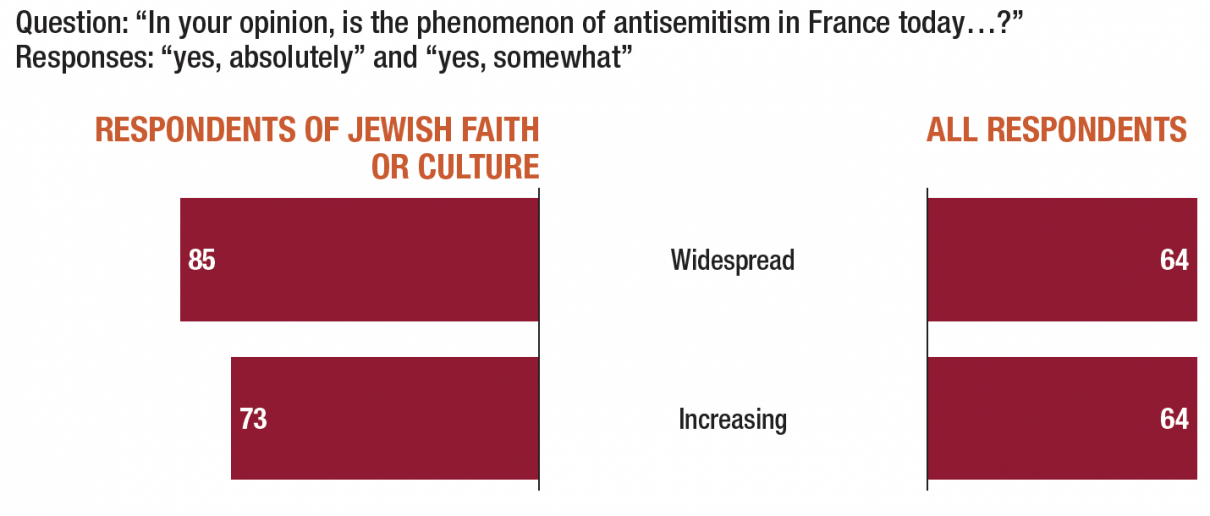
Copyright :
Ifop | AJC | Fondation pour l’innovation politique – March 2022
The feeling that antisemitism is talked about too much, enough or not enough (in %)
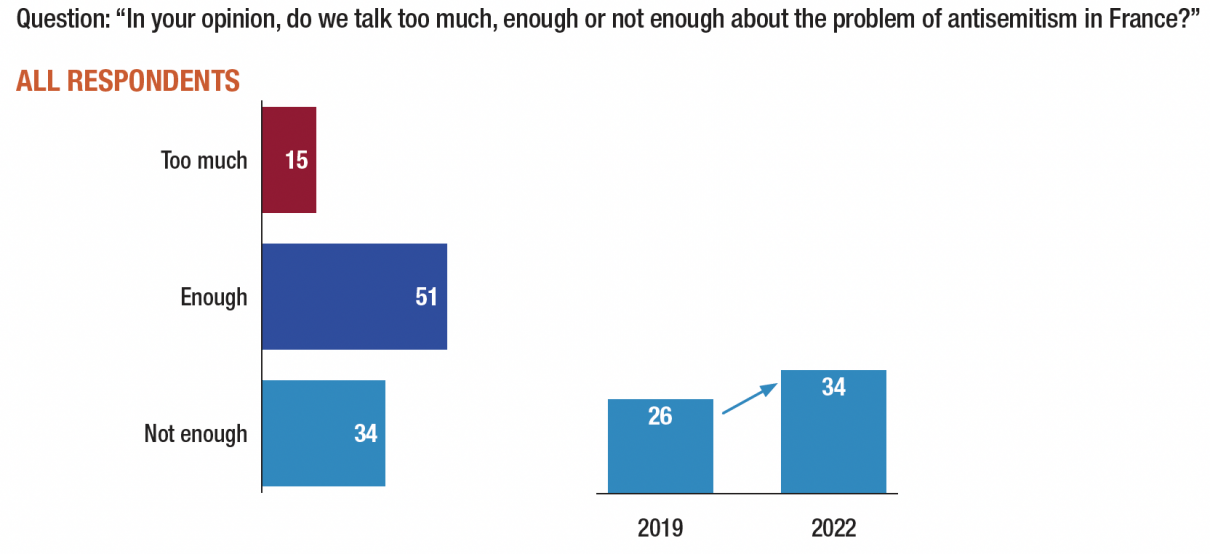
Copyright :
Ifop | AJC | Fondation pour l’innovation politique – March 2022
The perception of the causes of antisemitism in France [1/2] (in %)
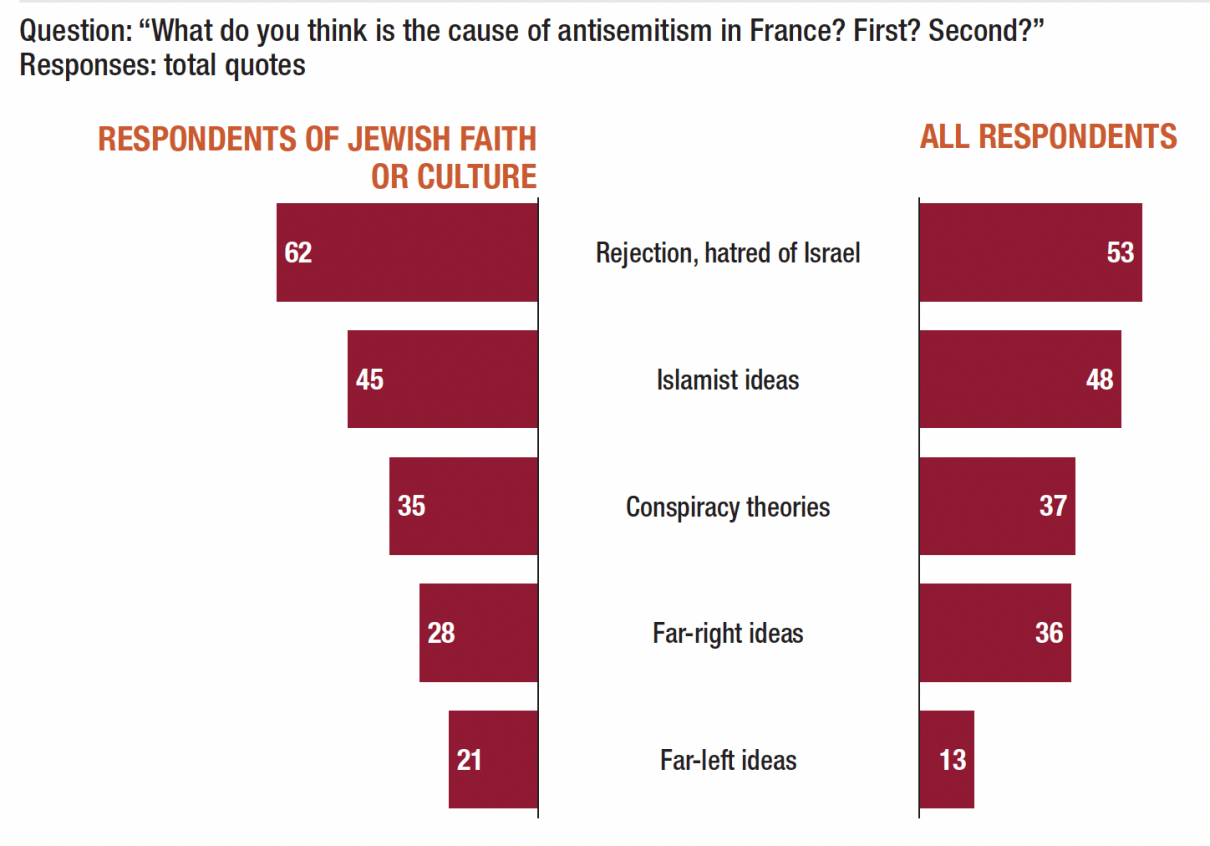
Copyright :
Ifop | AJC | Fondation pour l’innovation politique – March 2022
The perception of the causes of antisemitism in France [2/2] (in %)
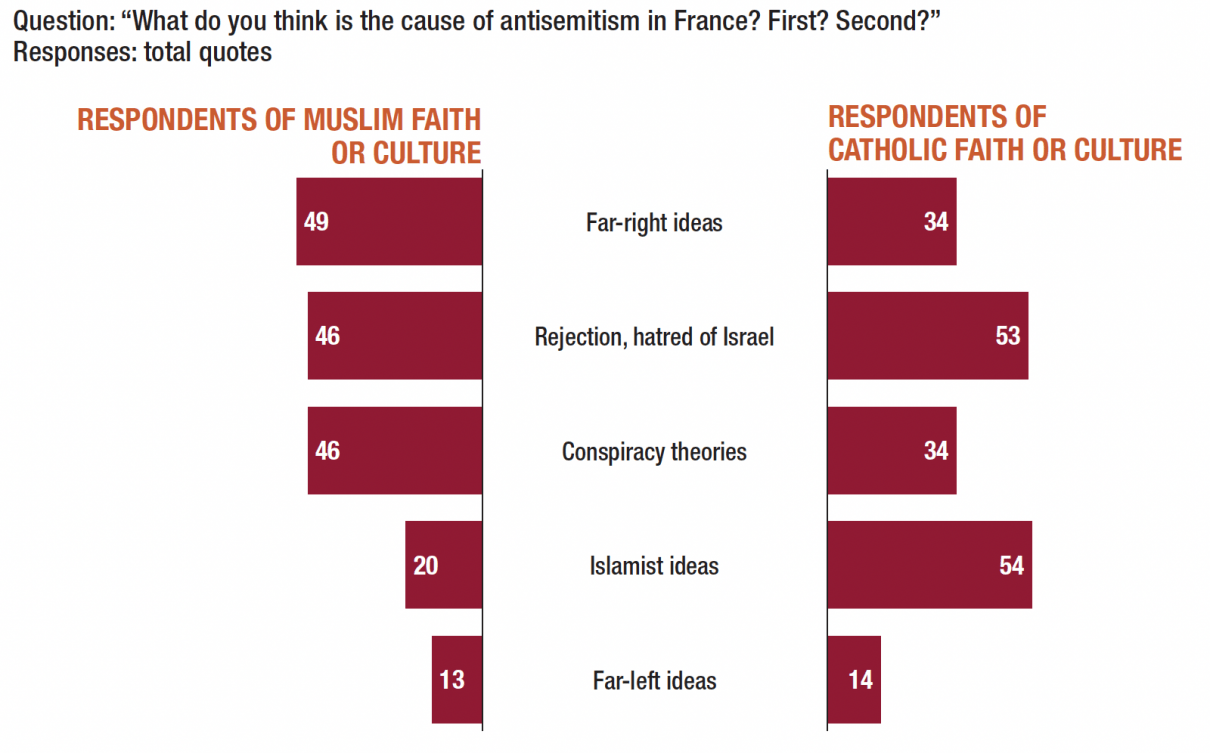
Copyright :
Ifop | AJC | Fondation pour l’innovation politique – March 2022
The feeling that antisemitism only affects Jews or society as a whole (in %)
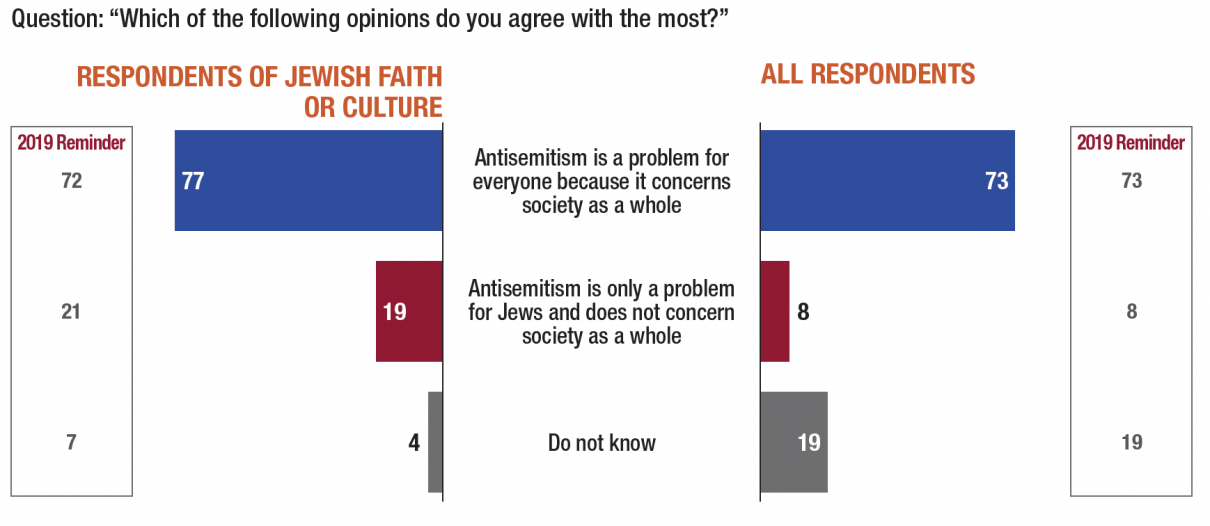
Copyright :
Ifop | AJC | Fondation pour l’innovation politique – March 2022
The persistence of antisemitic opinions within the French population
Sympathy or antipathy experienced for different categories or groups of people [1/2] (in %)
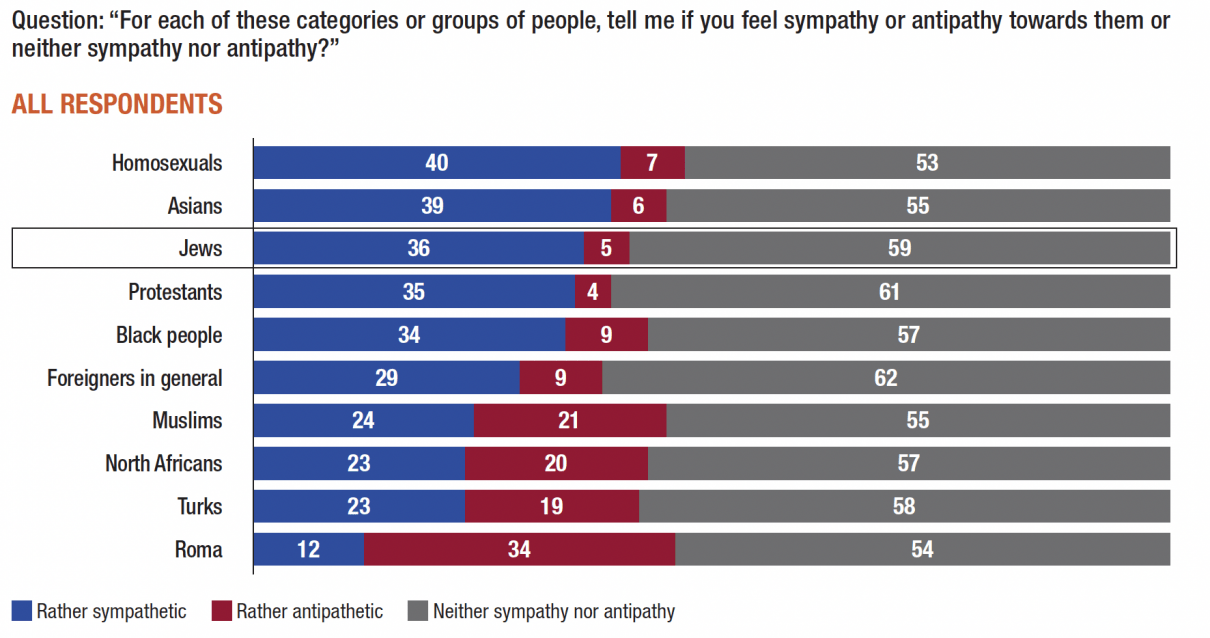
Copyright :
Ifop | AJC | Fondation pour l’innovation politique – March 2022
Sympathy or antipathy experienced for different categories or groups of people [2/2] (in %)
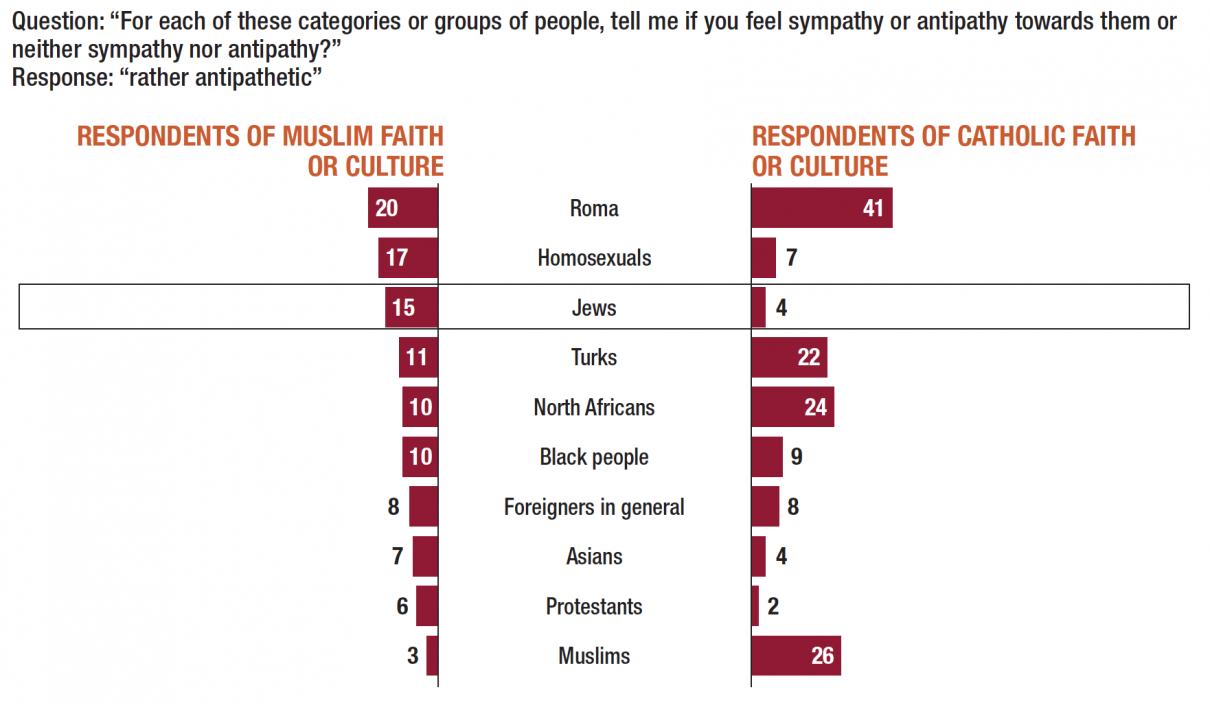
Copyright :
Ifop | AJC | Fondation pour l’innovation politique – March 2022
Endorsement of certain prejudices concerning Jews [1/5] (in %)
Changes since 2014

Copyright :
Ifop | AJC | Fondation pour l’innovation politique – March 2022
Endorsement for certain prejudices concerning Jews [2/5] (in %)
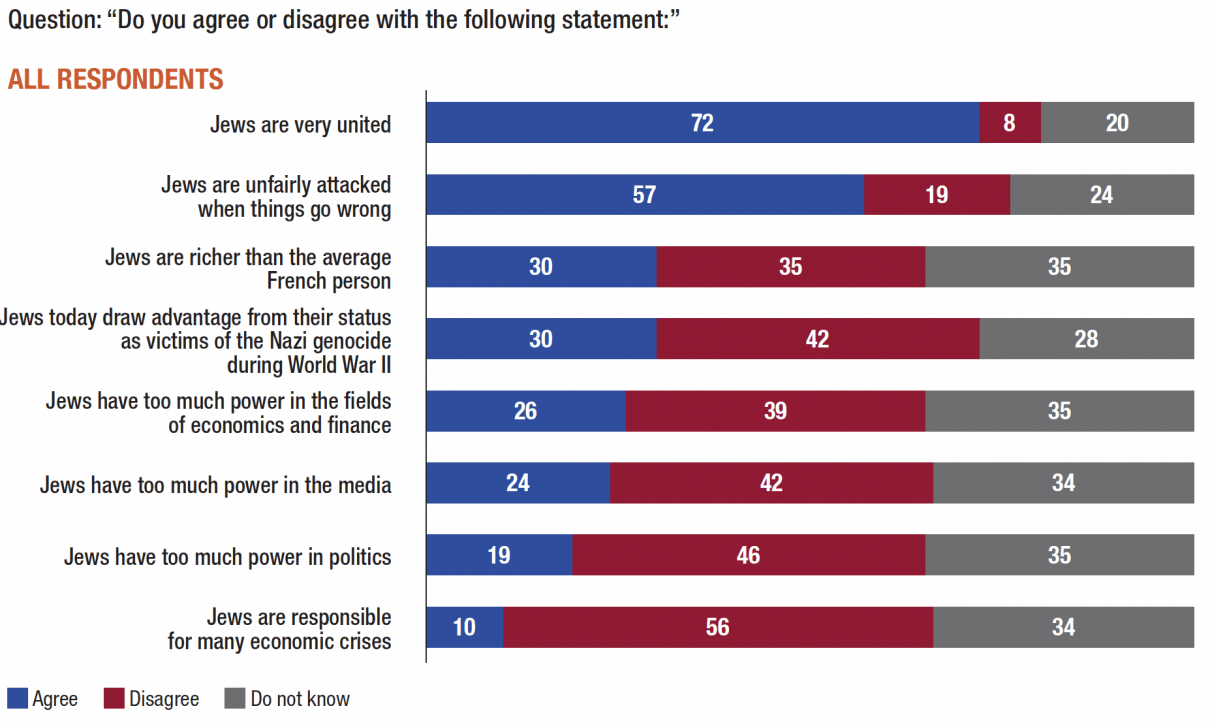
Copyright :
Ifop | AJC | Fondation pour l’innovation politique – March 2022
Endorsement for certain prejudices concerning Jews [3/5] (in %)
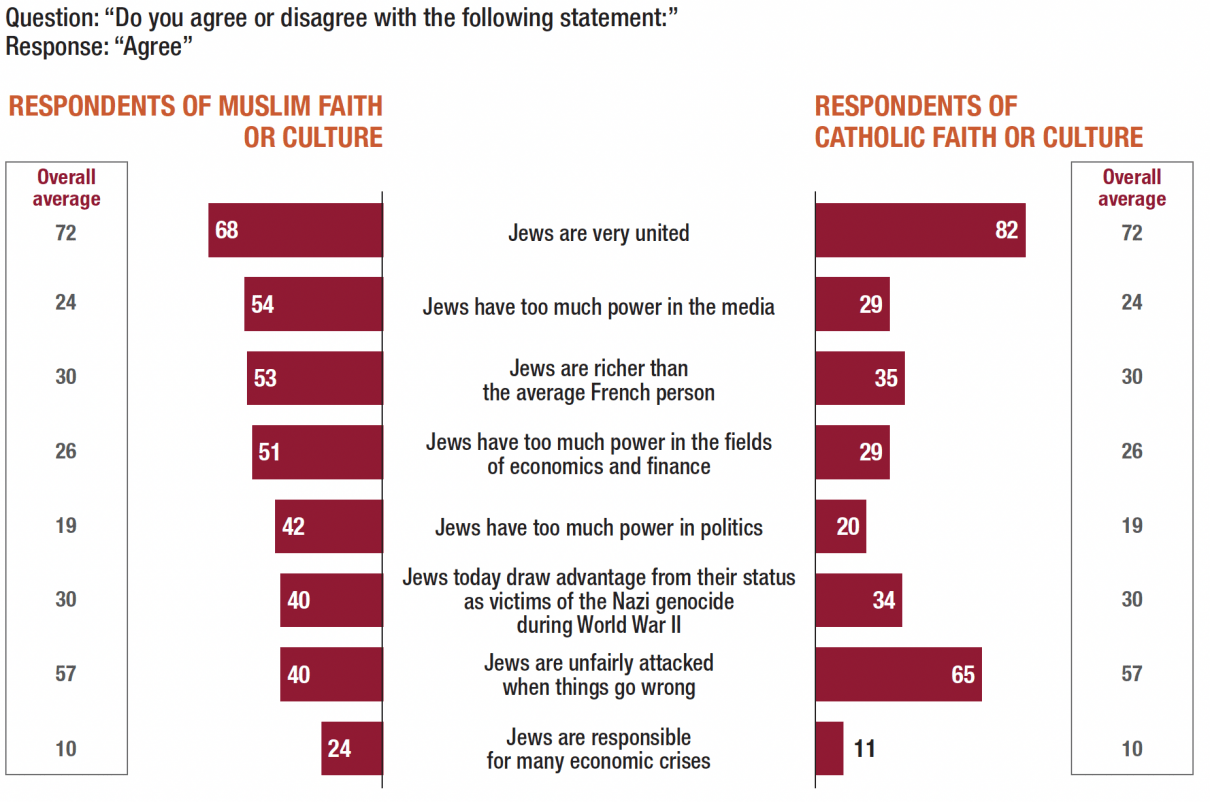
Copyright :
Ifop | AJC | Fondation pour l’innovation politique – March 2022
Endorsement for certain prejudices concerning Jews [4/5] (in %)
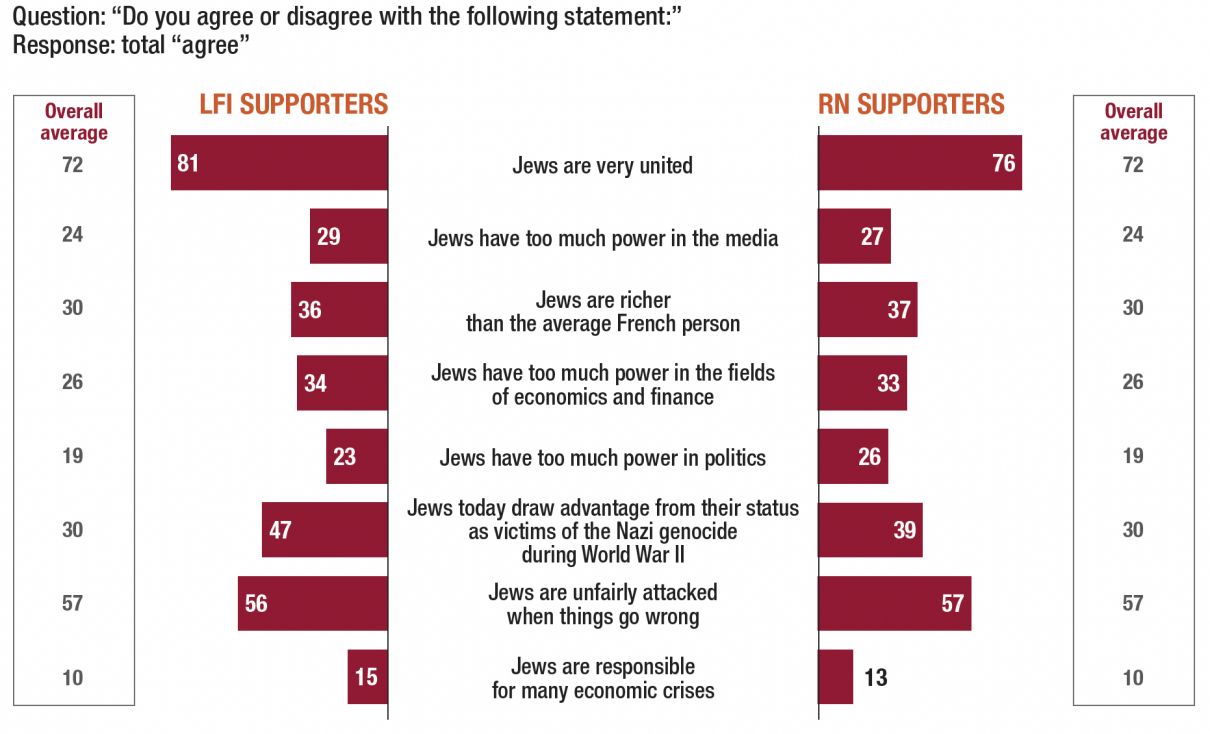
Copyright :
Ifop | AJC | Fondation pour l’innovation politique – March 2022
Endorsement for certain prejudices concerning Jews [5/5] (in %)
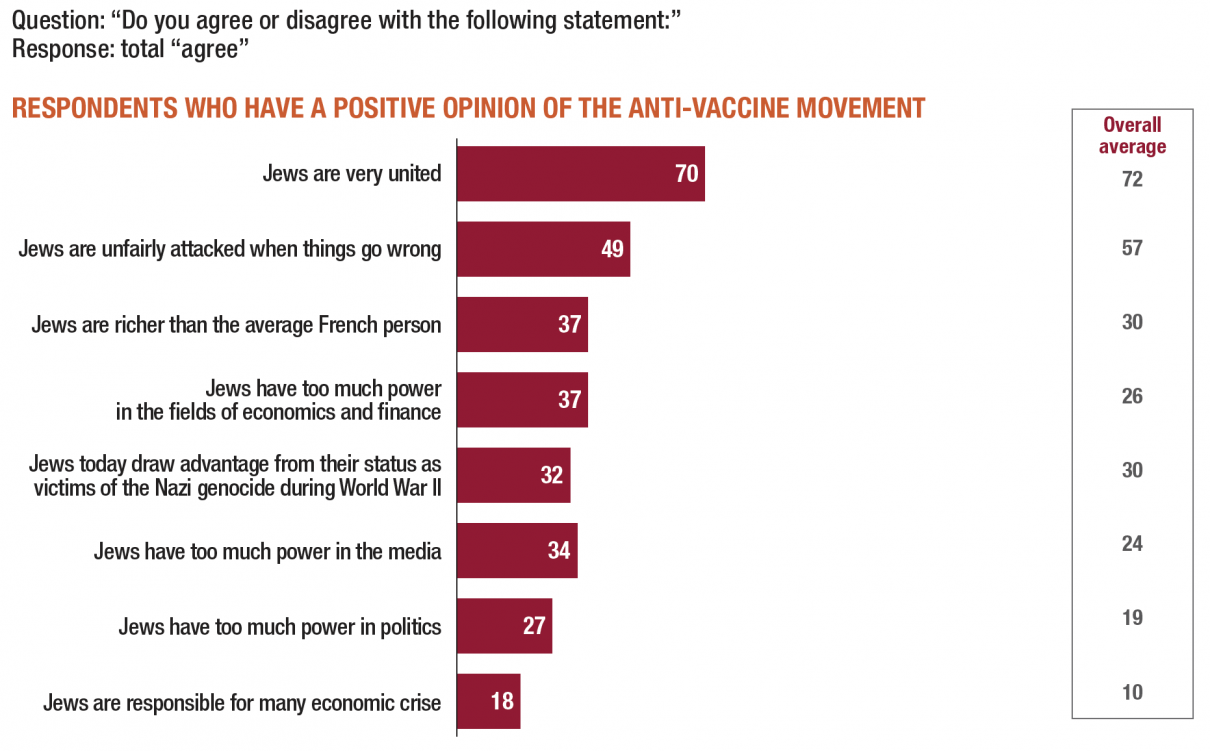
Copyright :
Ifop | AJC | Fondation pour l’innovation politique – March 2022
Importance given to commemorating the Holocaust (in %)
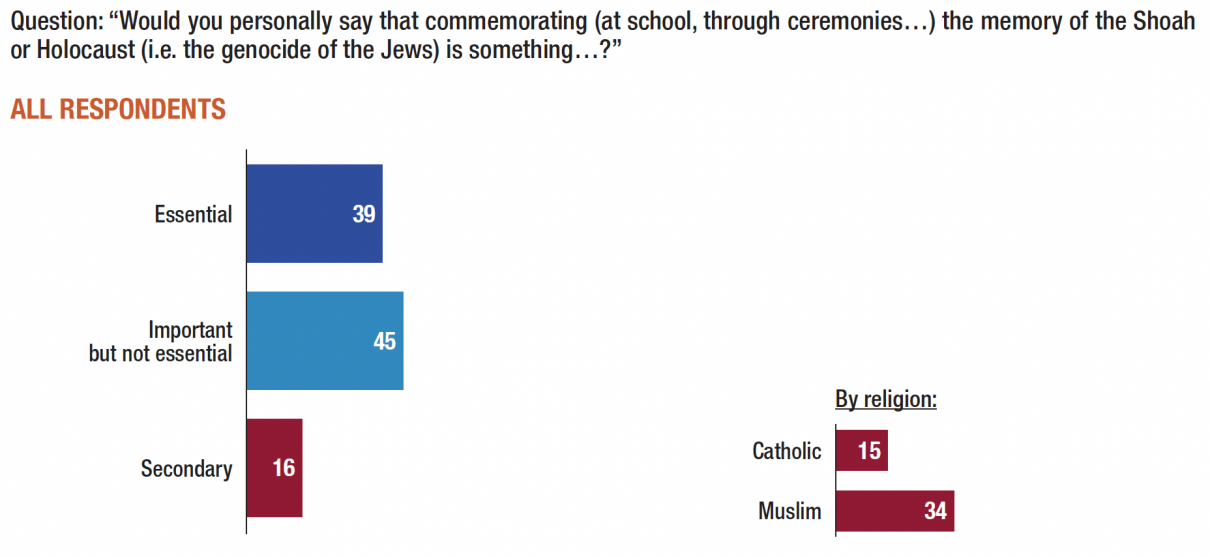
Copyright :
Ifop | AJC | Fondation pour l’innovation politique – March 2022
The feeling that the commemoration of the Holocaust prevents the expression of other tragedies in history (in %)
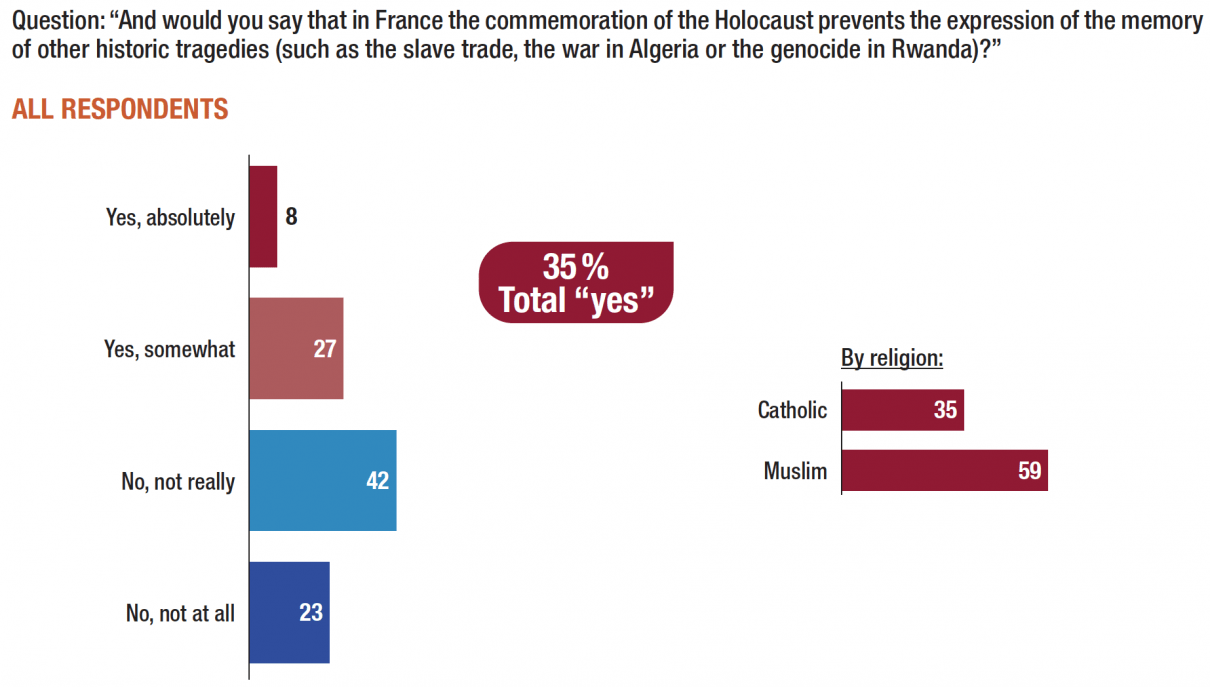
Copyright :
Ifop | AJC | Fondation pour l’innovation politique – March 2022
Endorsement of the idea that “Jews have too much power in the fields of economics and finance” [1/2] (in %)

Copyright :
Ifop | AJC | Fondation pour l’innovation politique – March 2022
Endorsement of the idea that “Jews have too much power in the fields of economics and finance” [2/2] (in %)

Copyright :
Ifop | AJC | Fondation pour l’innovation politique – March 2022
Antisemitism in everyday life : the state of mind of French people of jewish faith or culture
Feeling threatened due to religious affiliation, sexual orientation, gender or origin (often/from time to time) [1/2] (in %)
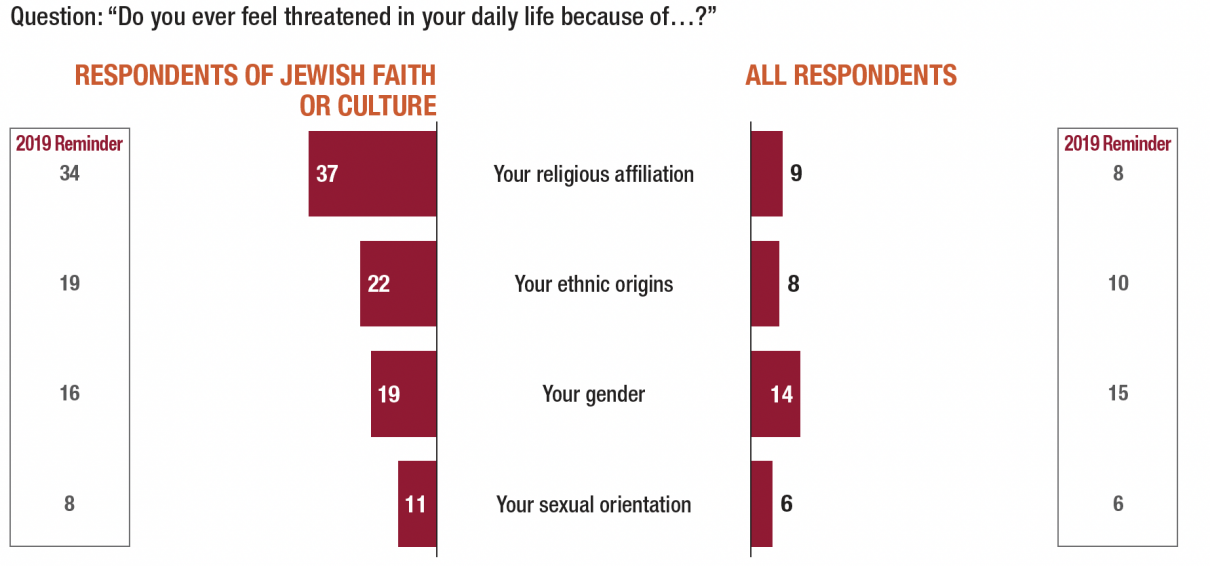
Copyright :
Ifop | AJC | Fondation pour l’innovation politique – March 2022
Feeling threatened due to religious affiliation, sexual orientation, gender or origin (often/from time to time) [2/2] (in %)
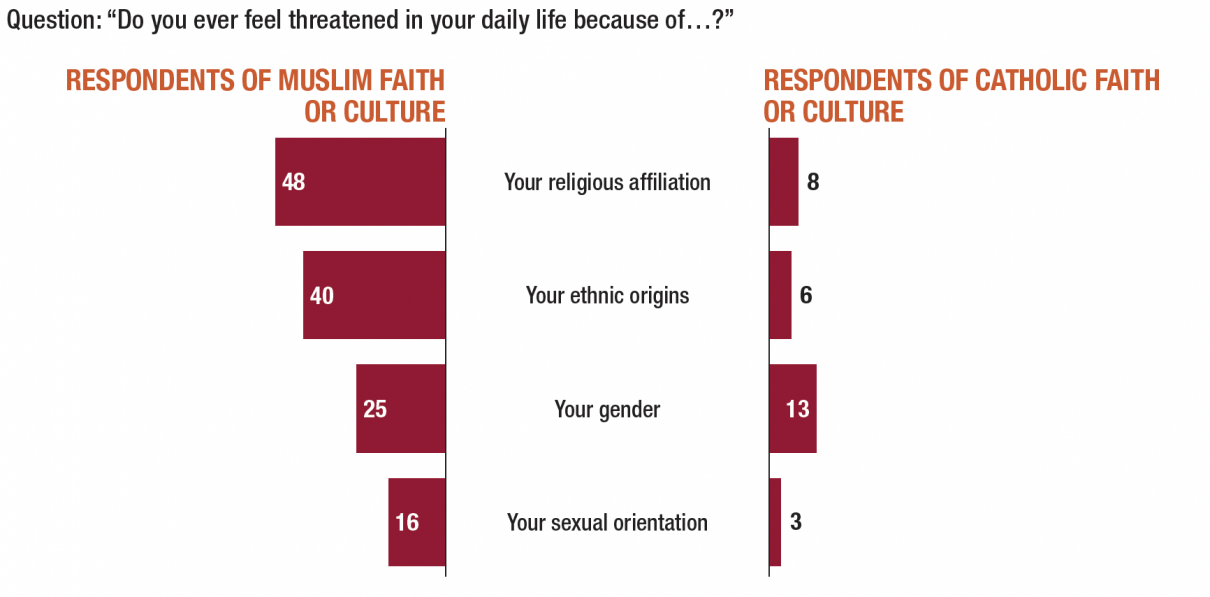
Copyright :
Ifop | AJC | Fondation pour l’innovation politique – March 2022
The profile of Jews who often or occasionally feel threatened due to their religious affiliation (in %)

Copyright :
Ifop | AJC | Fondation pour l’innovation politique – March 2022
Level of optimism for the future (%)
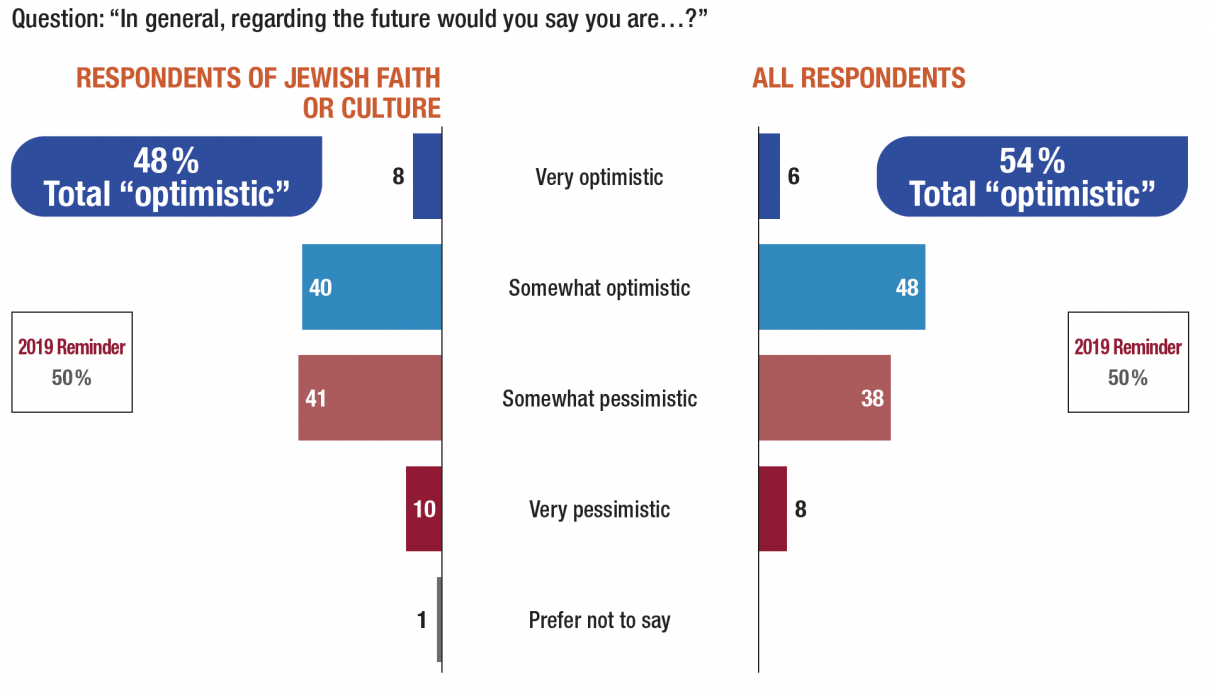
Copyright :
Ifop | AJC | Fondation pour l’innovation politique – March 2022
Antisemitic acts : observation and victimisation
Exposure to antisemitic acts [1/2] (in %)
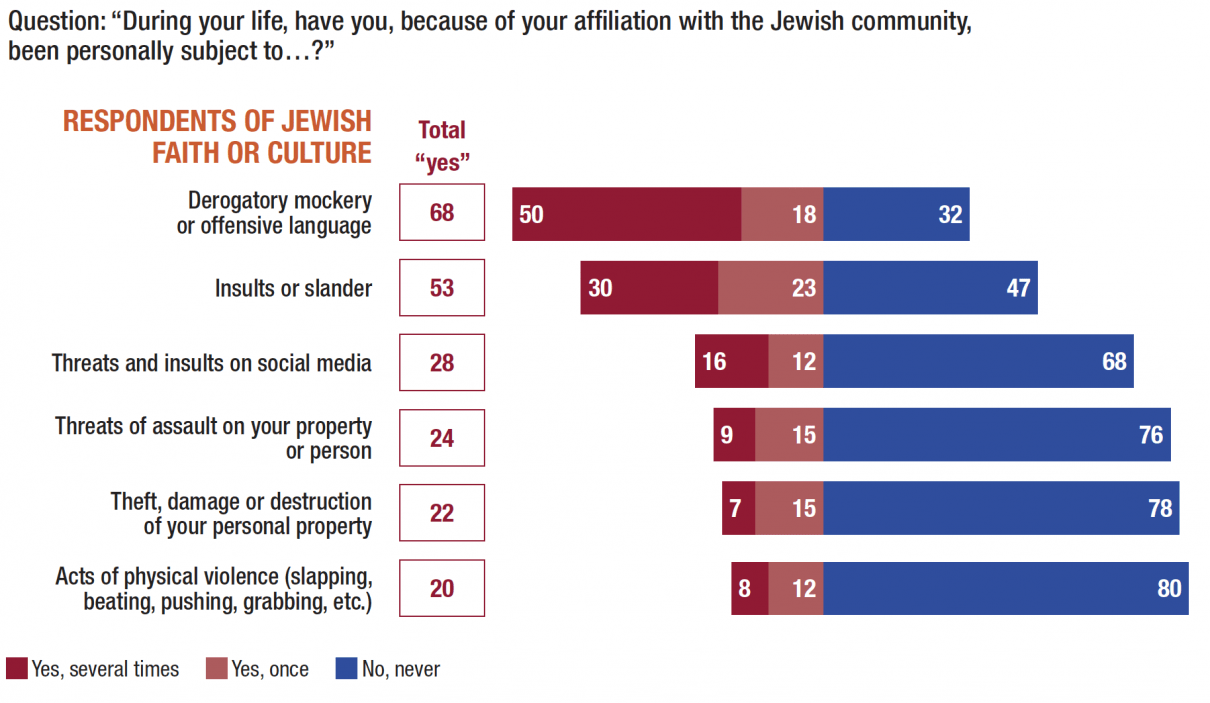
Copyright :
Ifop | AJC | Fondation pour l’innovation politique – March 2022
Exposure to antisemitic acts [2/2] (in %)
Changes compared to 2019
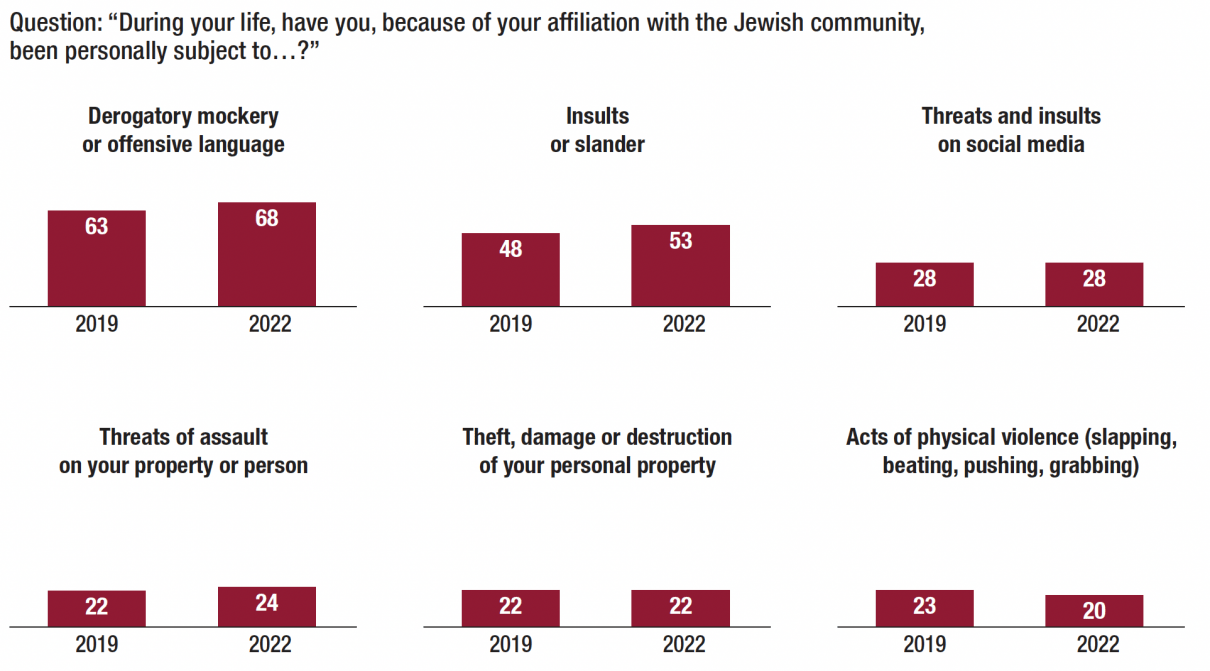
Copyright :
Ifop | AJC | Fondation pour l’innovation politique – March 2022
Exposure to antisemitic acts and wearing of distinctive signs of Judaism (in %)
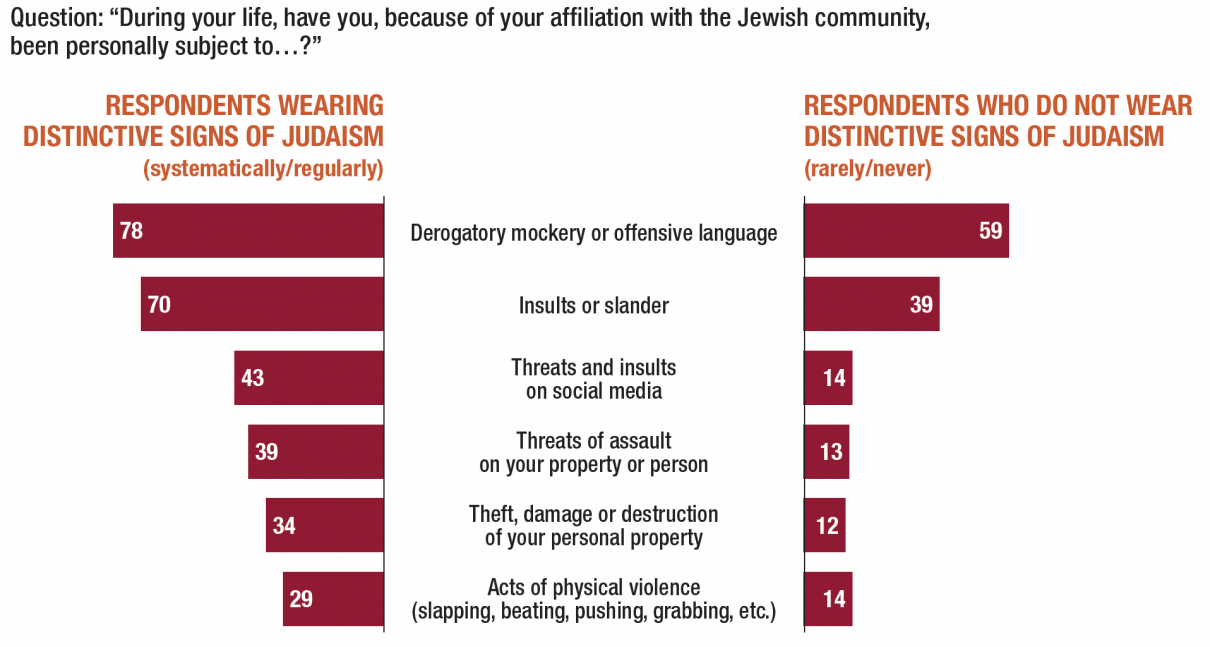
Copyright :
Ifop | AJC | Fondation pour l’innovation politique – March 2022
Places of exposure to antisemitic verbal attacks and the wearing of religious signs (in %)
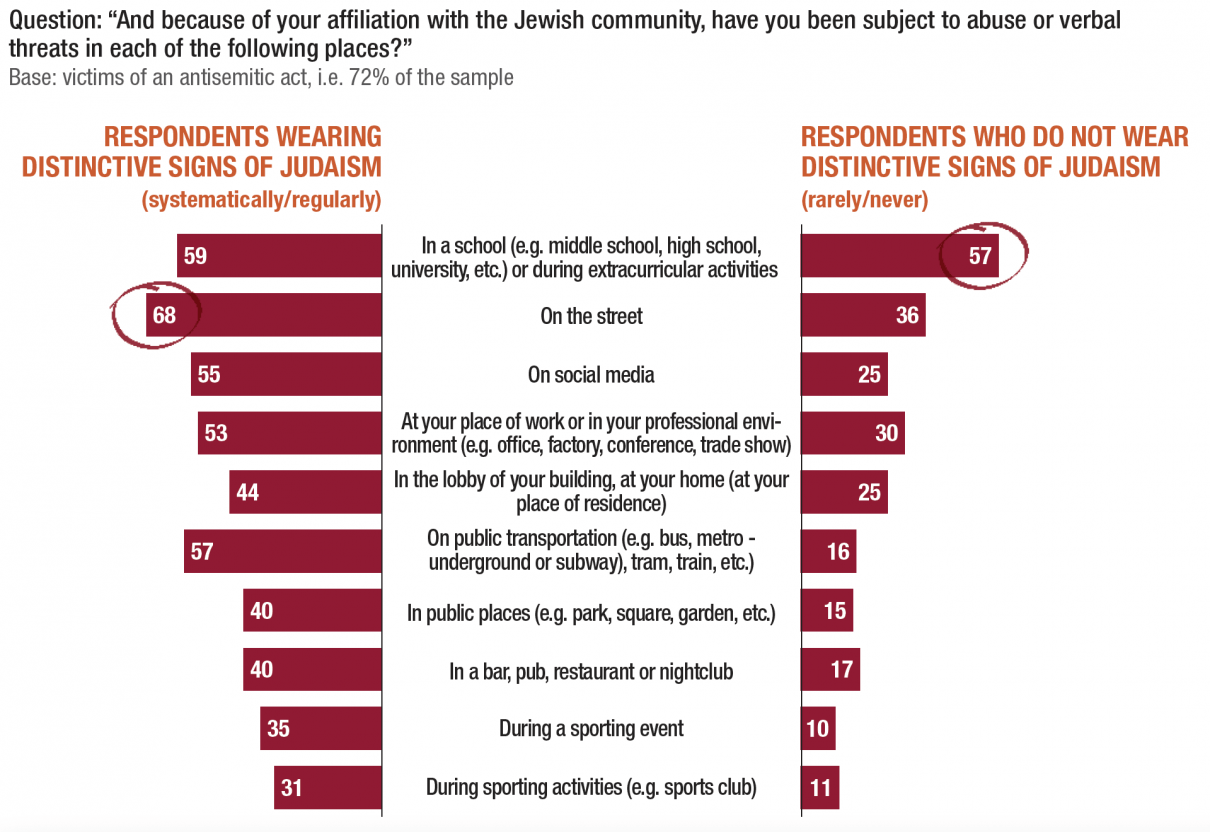
Copyright :
Ifop | AJC | Fondation pour l’innovation politique – March 2022
Places of exposure to antisemitic verbal attacks [1/2] (in %)
Changes compared to 2019
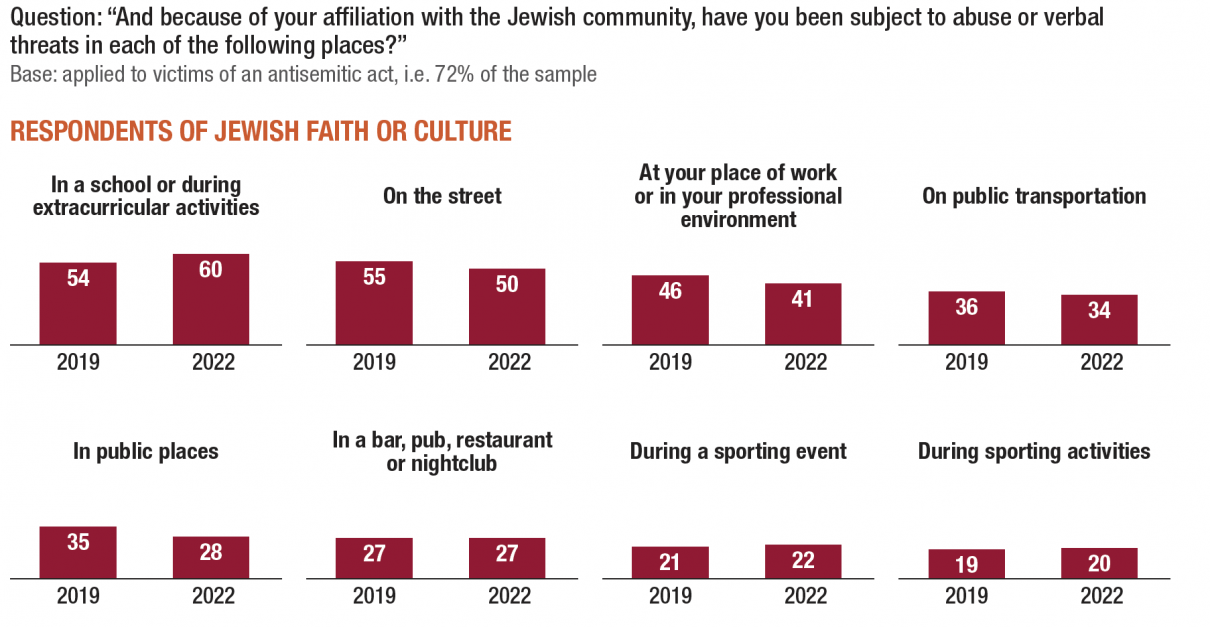
Copyright :
Ifop | AJC | Fondation pour l’innovation politique – March 2022
Places of exposure to antisemitic verbal attacks [2/2] (in %)
All victims
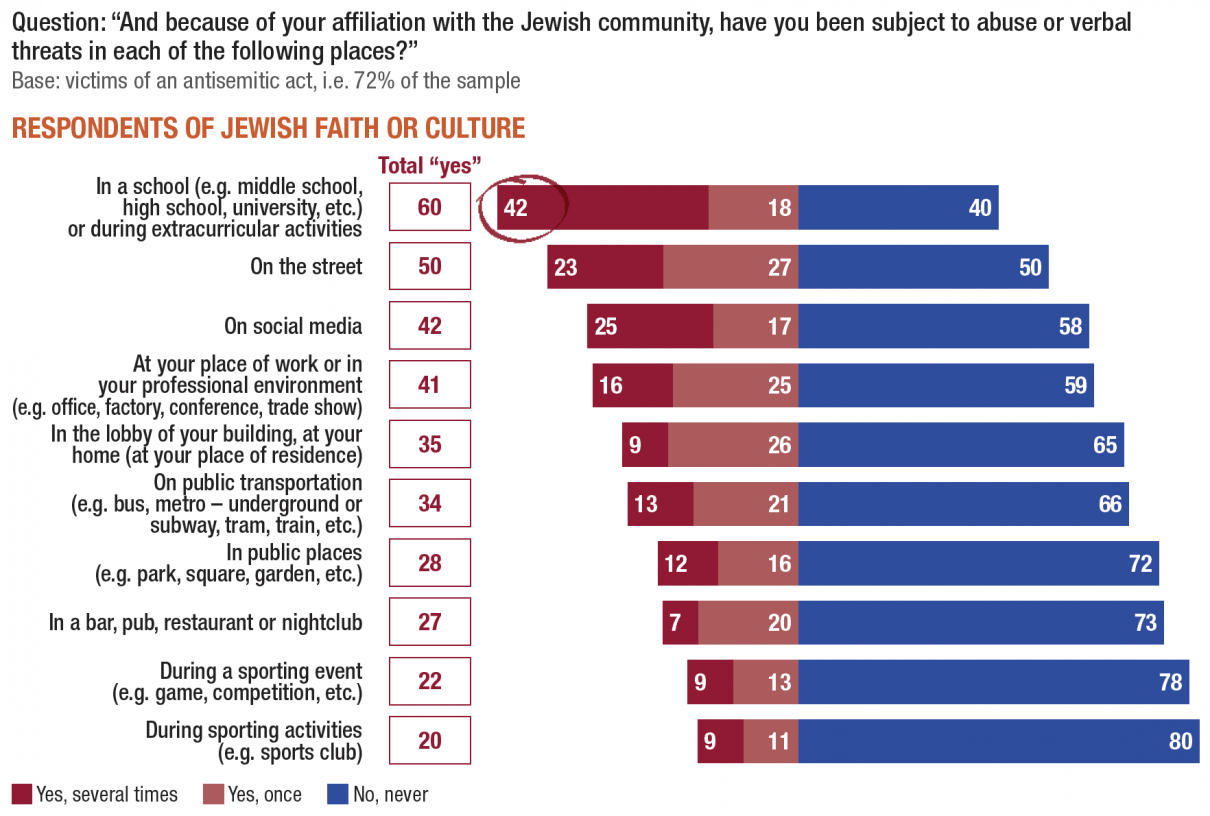
Copyright :
Ifop | AJC | Fondation pour l’innovation politique – March 2022
Profile of Jews subjected to antisemitic slurs (in %)

Copyright :
Ifop | AJC | Fondation pour l’innovation politique – March 2022
Profile of physically assaulted Jews (in %)

Copyright :
Ifop | AJC | Fondation pour l’innovation politique – March 2022
“Have any of your children ever been insulted/ physically attacked because they are Jewish” (in %)
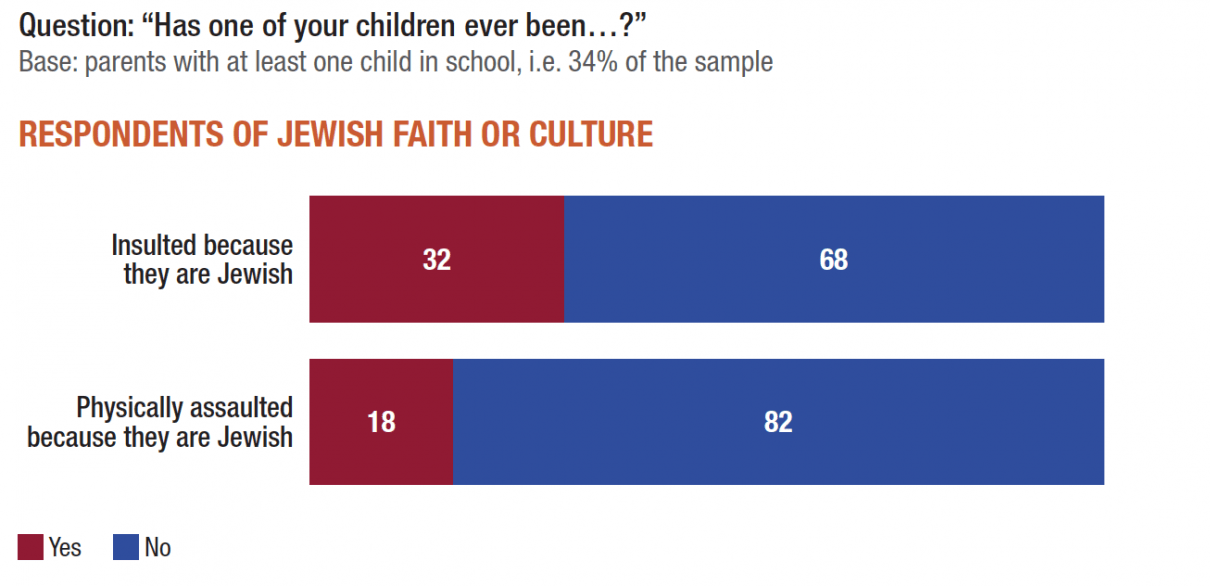
Copyright :
Ifop | AJC | Fondation pour l’innovation politique – March 2022
“Have you ever heard people around you say negative remarks about Jews? (in %)
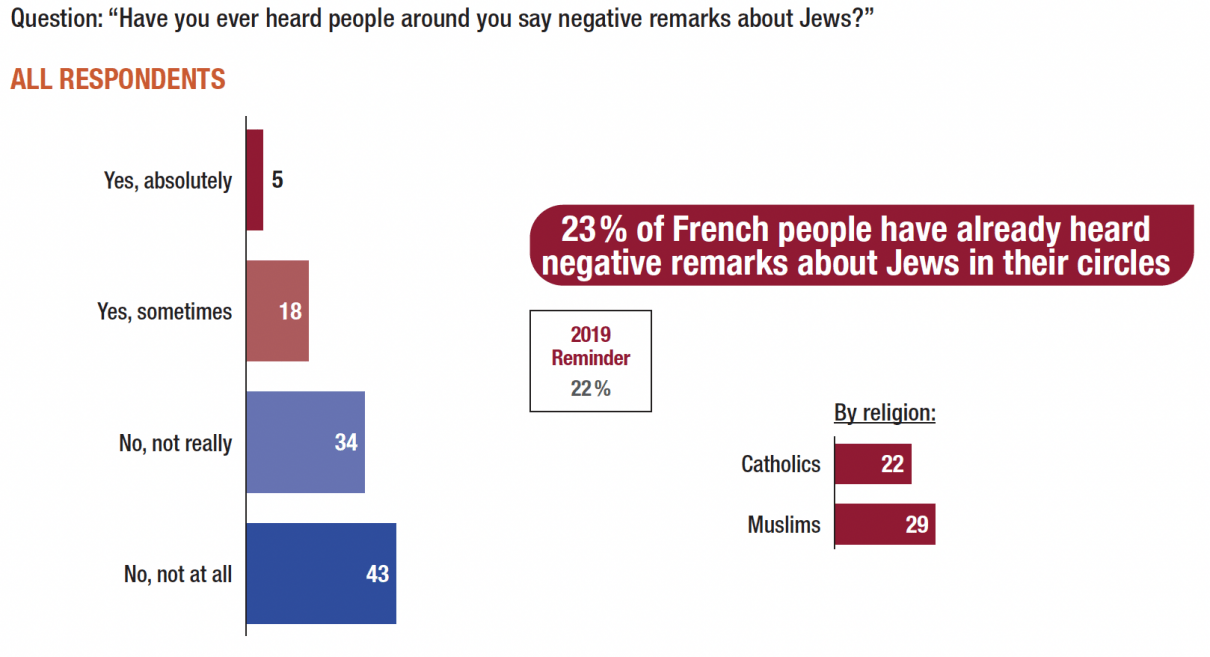
Copyright :
Ifop | AJC | Fondation pour l’innovation politique – March 2022
“In your lifetime, have you ever witnessed any of the following actions and behaviours? [1/2] (in %)
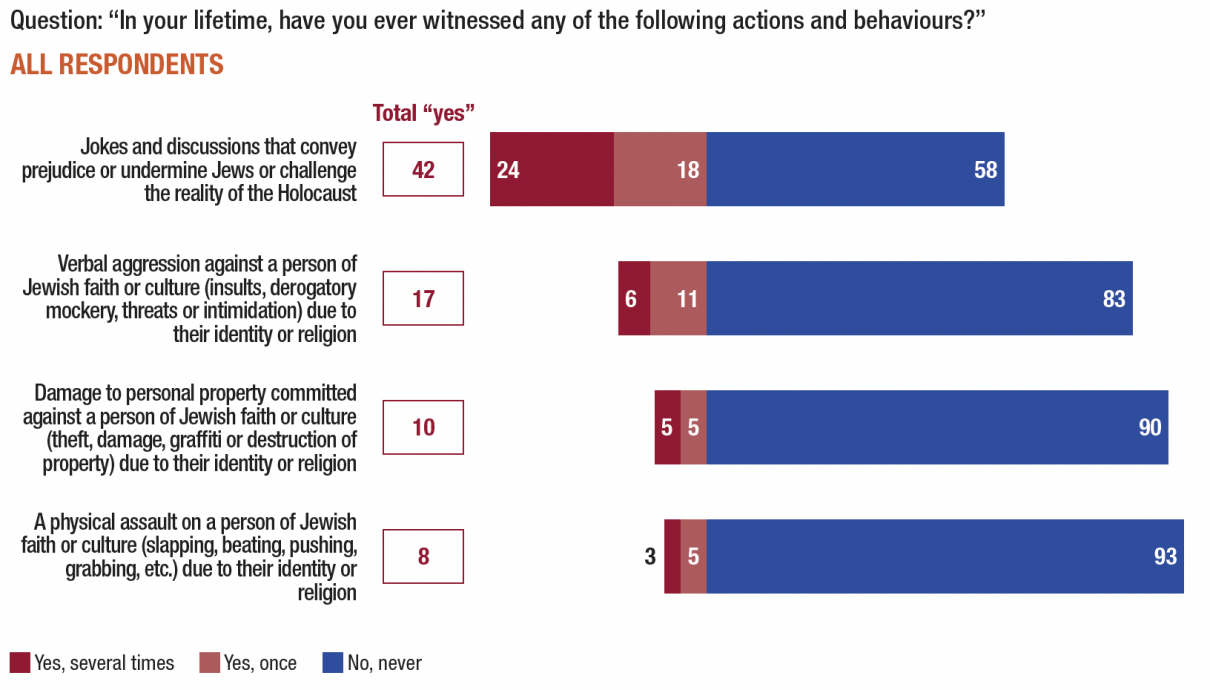
Copyright :
Ifop | AJC | Fondation pour l’innovation politique – March 2022
“In your lifetime, have you ever witnessed any of the following actions and behaviours?
[1/2] (in %)
Changes since 2019
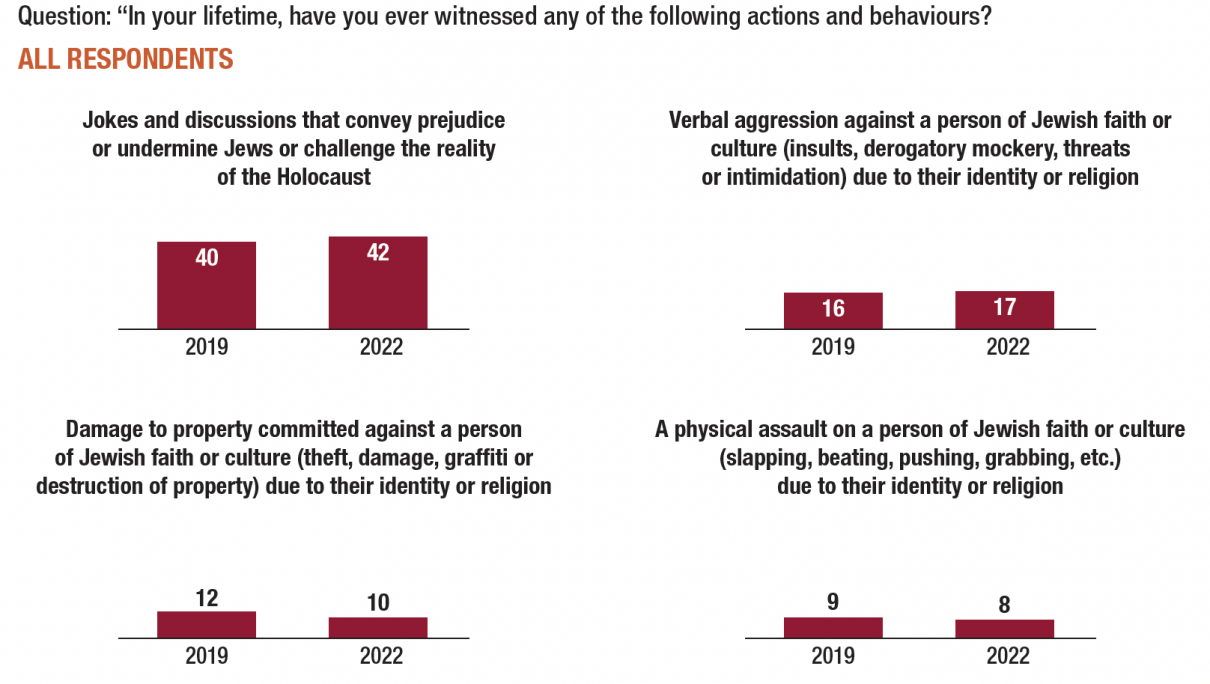
Copyright :
Ifop | AJC | Fondation pour l’innovation politique – March 2022
Places where antisemitic aggression or speech is observed (in %)

Copyright :
Ifop | AJC | Fondation pour l’innovation politique – March 2022
Behaviours of avoidance and strategies of concealing
What is the reaction to an antisemitic attack? Inform relatives, talk to a community association, file a complaint (in %)
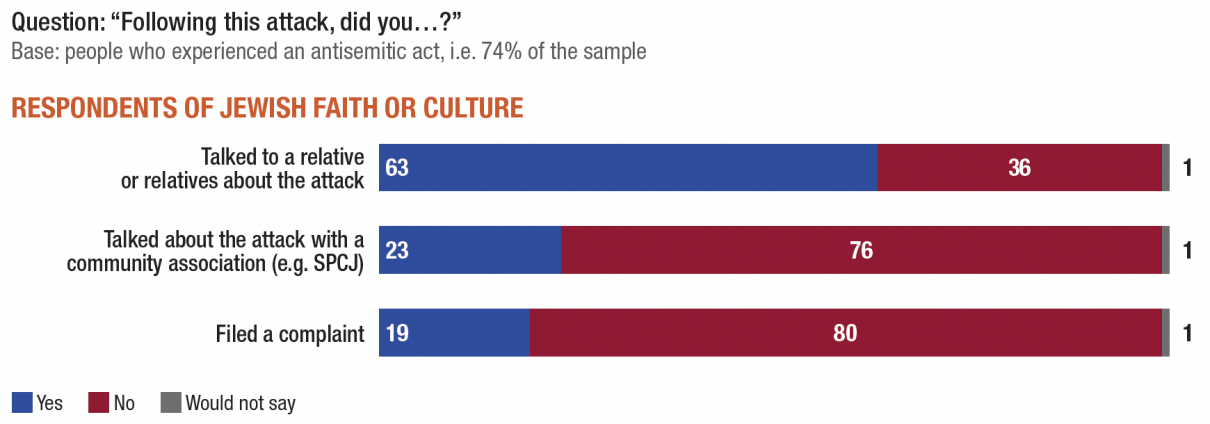
Copyright :
Ifop | AJC | Fondation pour l’innovation politique – March 2022
Adoption of avoidance behaviours (in %)
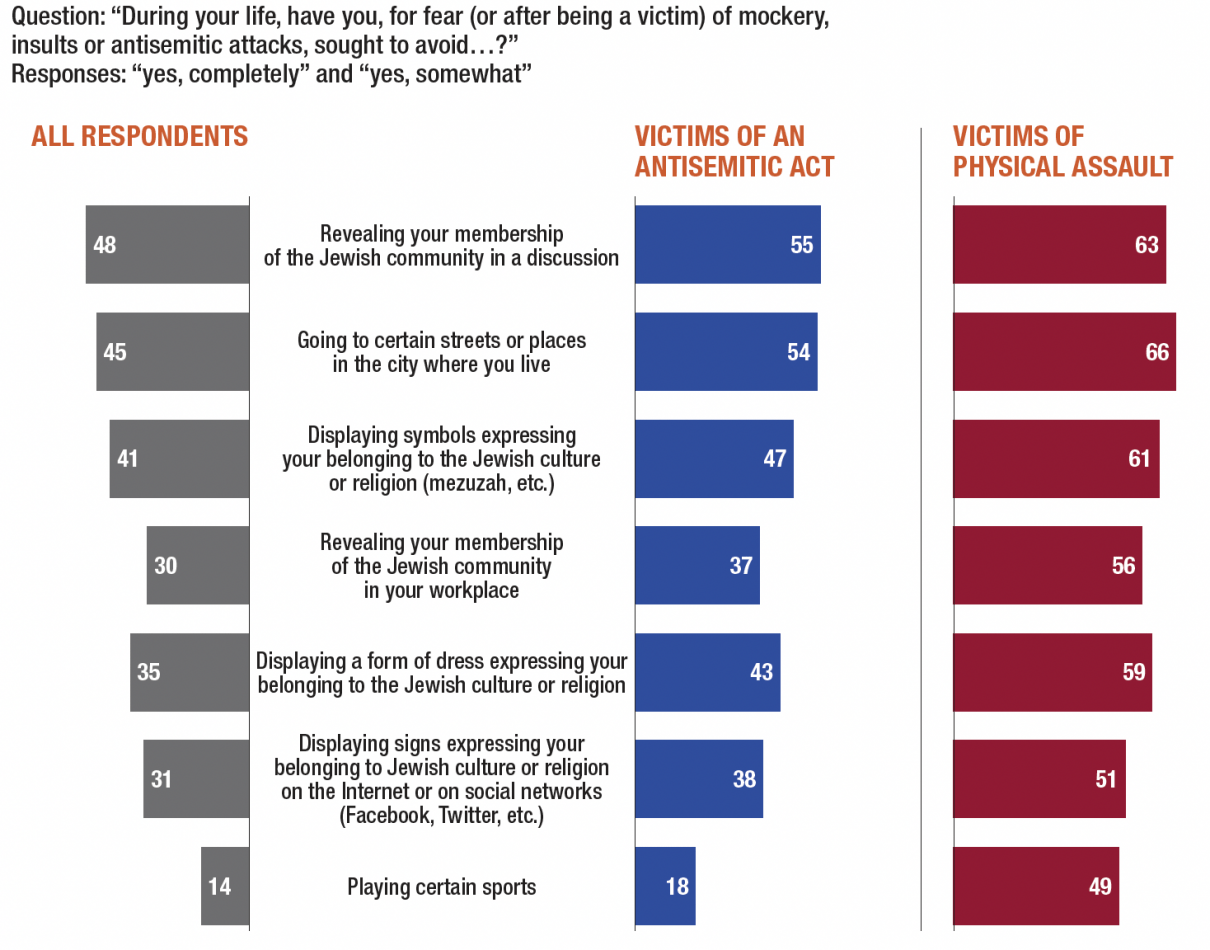
Copyright :
Ifop | AJC | Fondation pour l’innovation politique – March 2022
The feelings and behaviour of French people of Jewish faith or culture during periods of tension between Palestinians and Israelis [1/2] (in %)
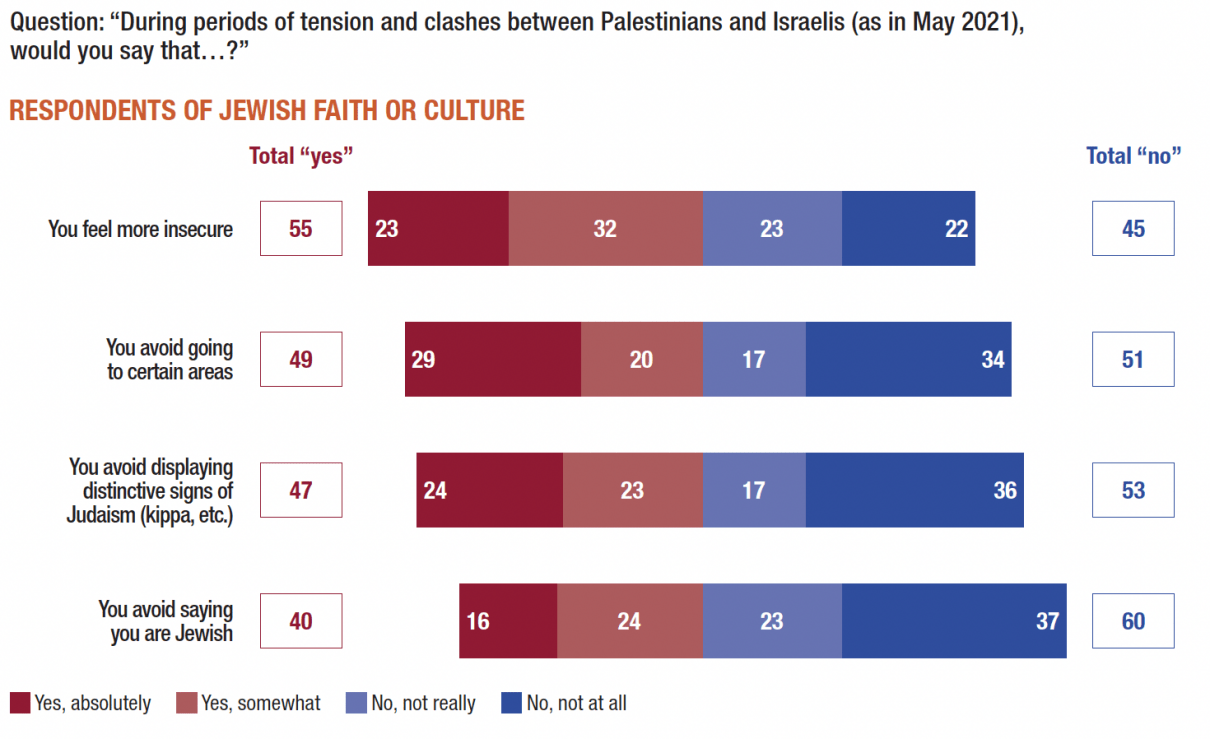
Copyright :
Ifop | AJC | Fondation pour l’innovation politique – March 2022
The feelings and behaviour of French people of Jewish faith or culture during periods of tension between Palestinians and Israelis [2/2] (in %)
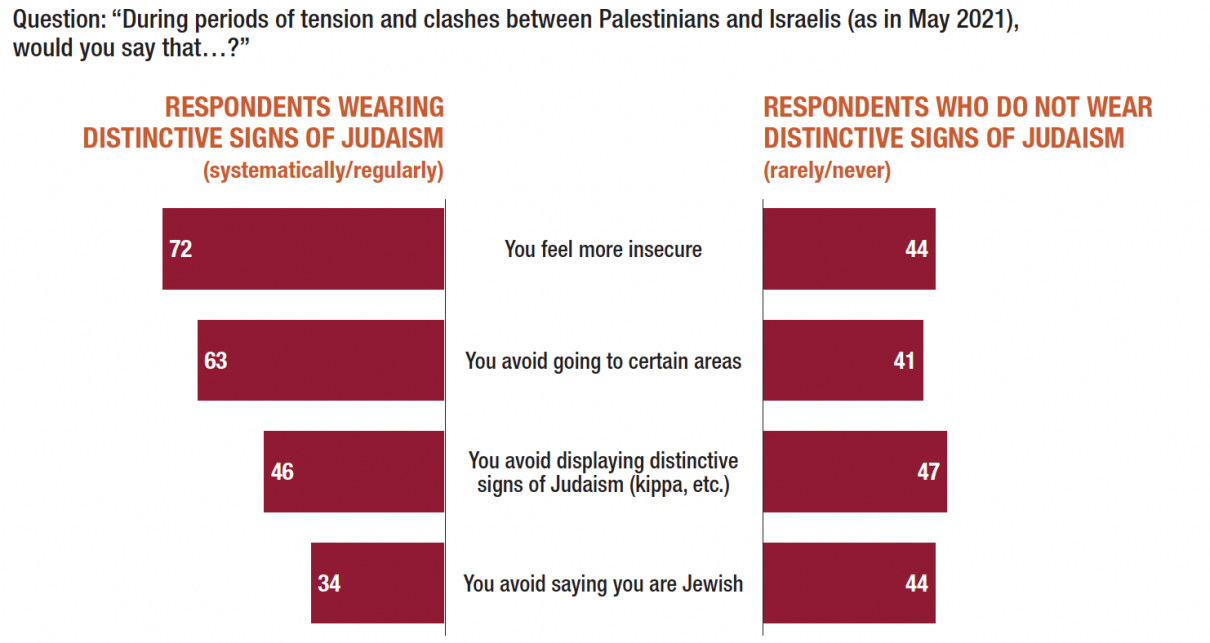
Copyright :
Ifop | AJC | Fondation pour l’innovation politique – March 2022
“Do you ever ask your child to adopt avoidance behaviours in order to protect them from antisemitism? (in %)
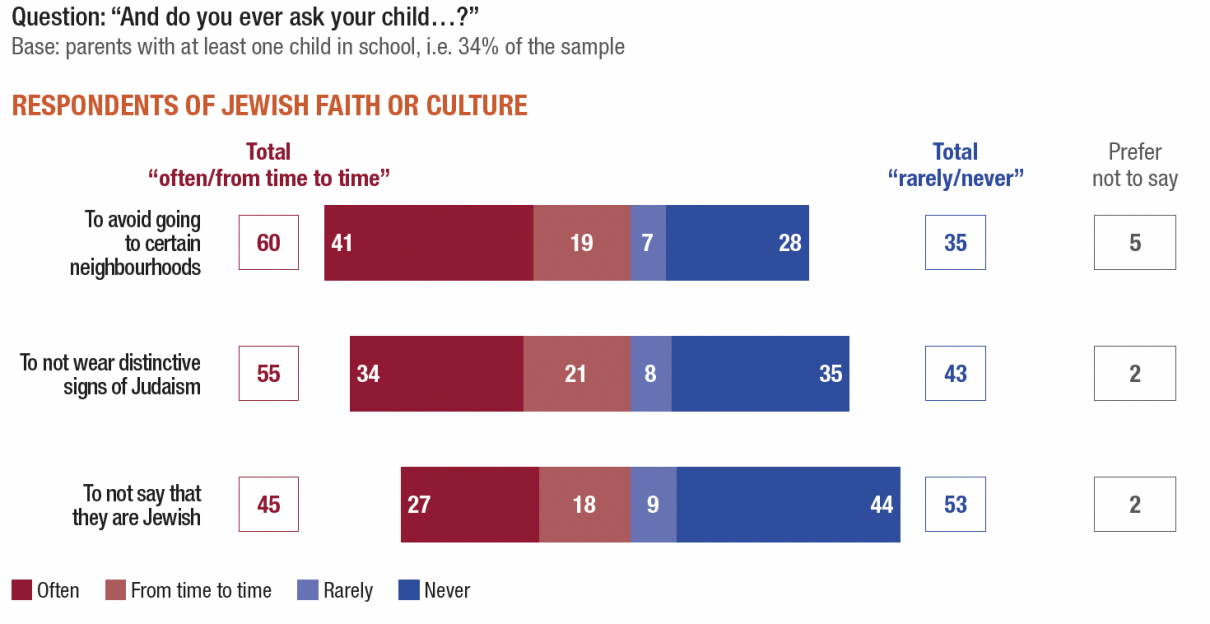
Copyright :
Ifop | AJC | Fondation pour l’innovation politique – March 2022
“Have you ever considered leaving France? (in %)
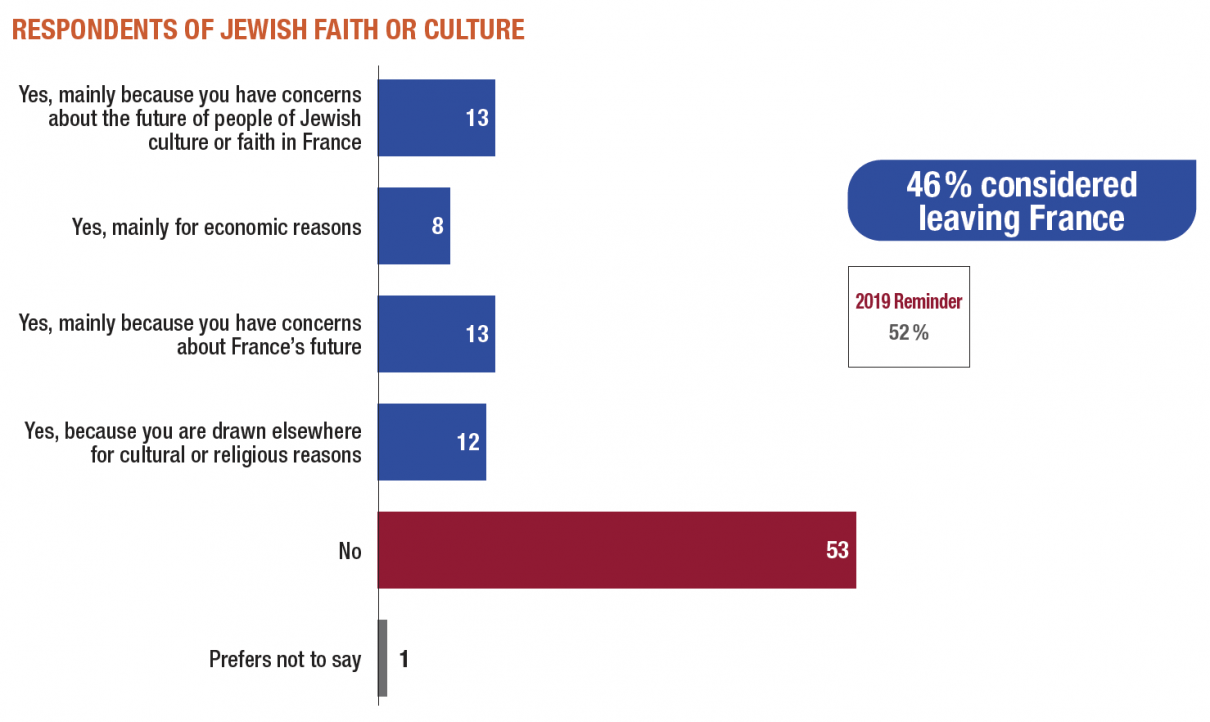
Copyright :
Ifop | AJC | Fondation pour l’innovation politique – March 2022
The profile of Jews who have already considered leaving France (in %)
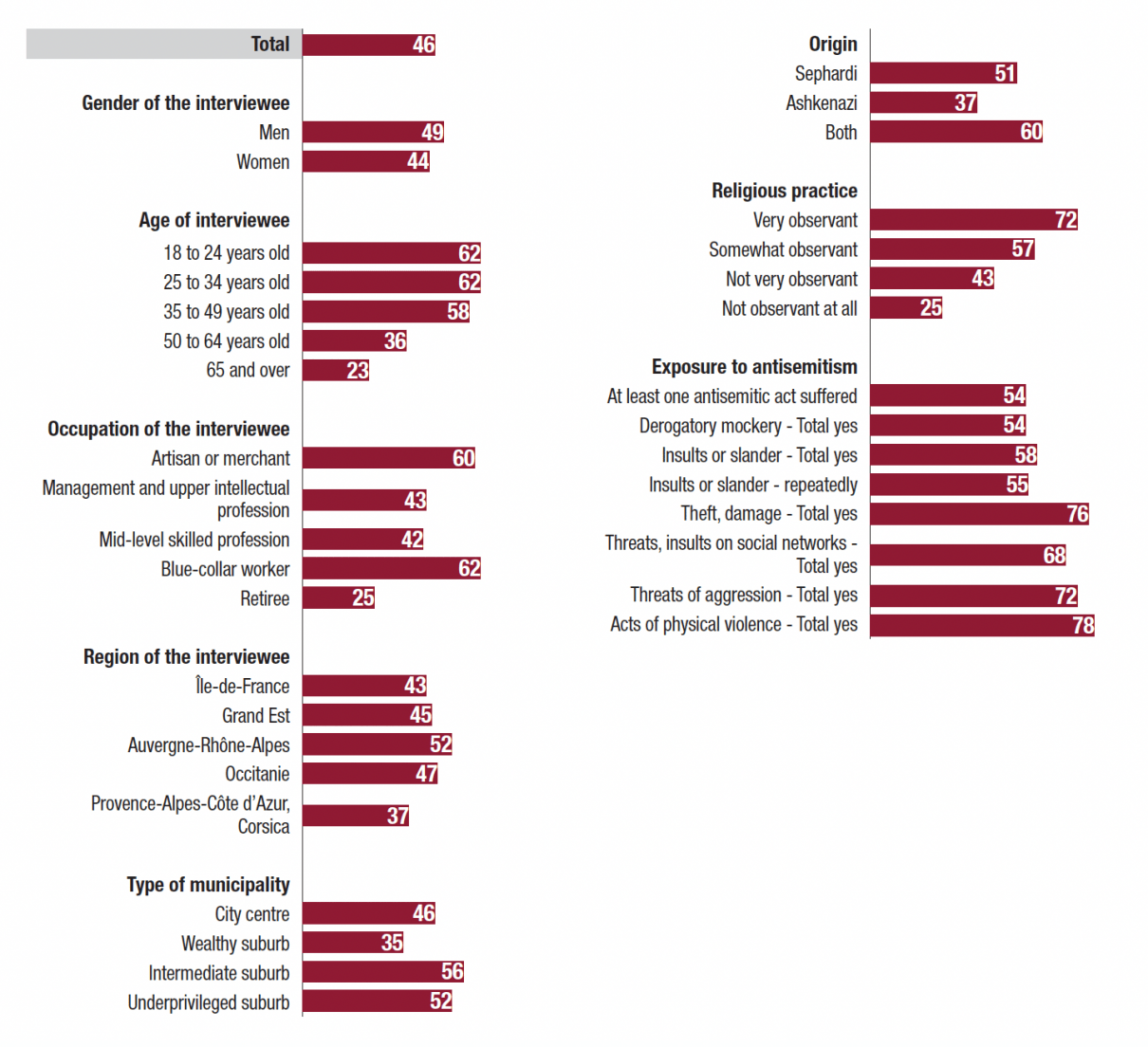
Copyright :
Ifop | AJC | Fondation pour l’innovation politique – March 2022
Opinion on the ban on protests in support of the Palestinian cause in May 2021 (in %)
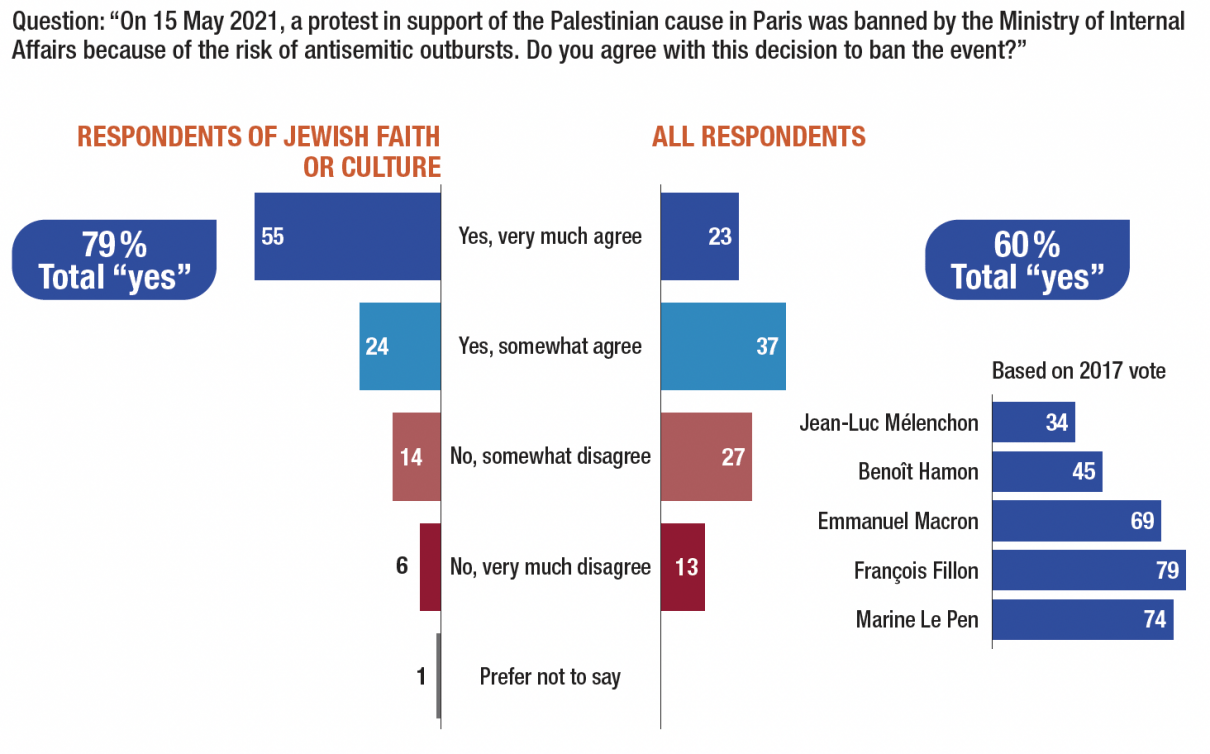
Copyright :
Ifop | AJC | Fondation pour l’innovation politique – March 2022
On 4 April 2017, Sarah Halimi, a retired Jewish woman, was beaten before being pushed through the window of her apartment in the XIth arrondissement of Paris by her neighbour Kobili Traoré. He is being examined by several psychiatrists who agree that he acted in a delusional state resulting from a significant dose of cannabis. On 19 December 2019, the Paris Court of Appeal declared him legally incompetent. On 3 March 2021, the Appeal Court of Cassation confirmed Kobili Traoré’s legal incompetence; he was not tried and was committed to a psychiatric hospital.
Opinion on the court decision in the Sarah Halimi case (in %)

Ifop | AJC | Fondation pour l’innovation politique – March 2022
The feeling that different opinions related to Israel or Jews are antisemitic or anti-Zionist [1/3] (in %)
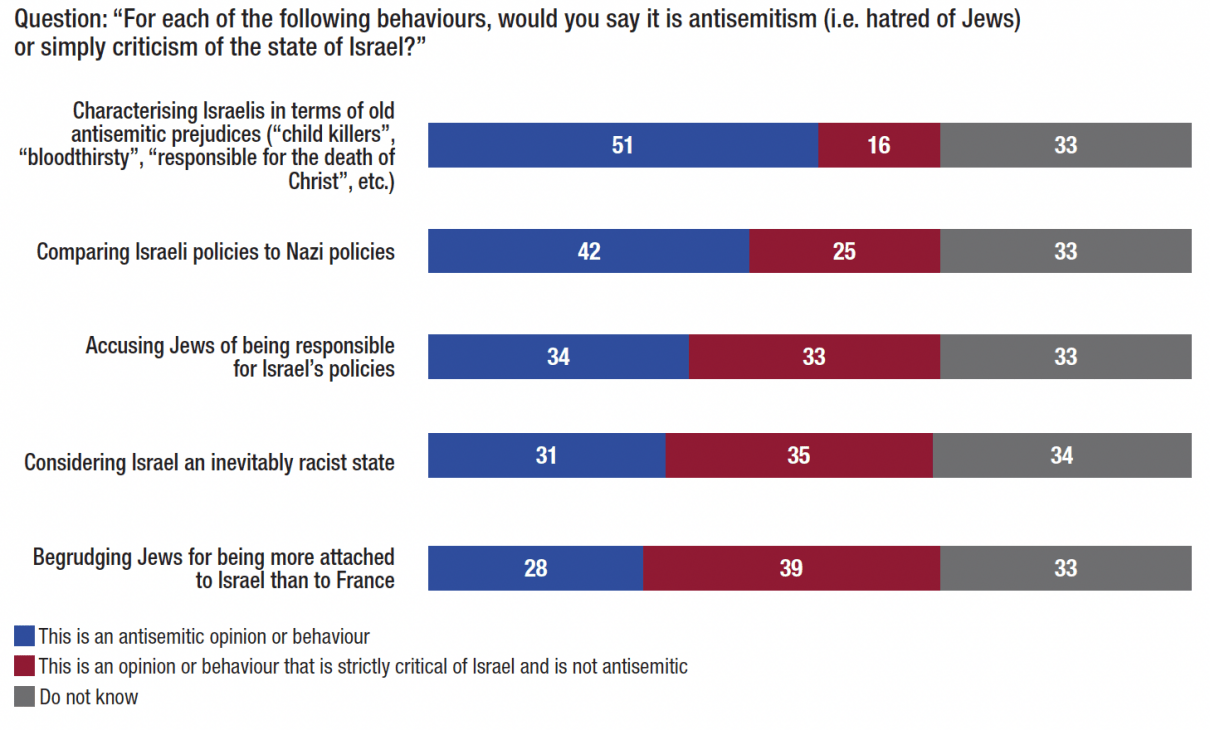
Copyright :
Ifop | AJC | Fondation pour l’innovation politique – March 2022
The feeling that different opinions related to Israel or Jews are antisemitic or anti-Zionist [2/3] (in %)
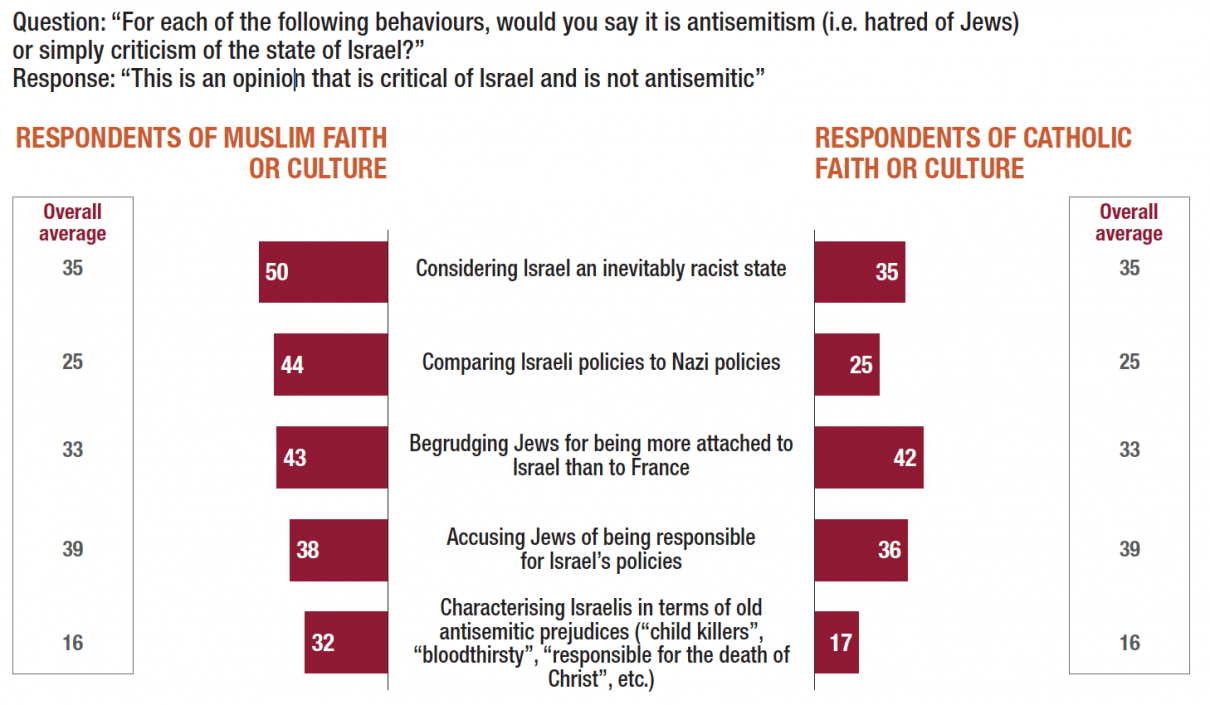
Copyright :
Ifop | AJC | Fondation pour l’innovation politique – March 2022
The feeling that different opinions related to Israel or Jews are antisemitic or anti-Zionist [3/3] (in %)
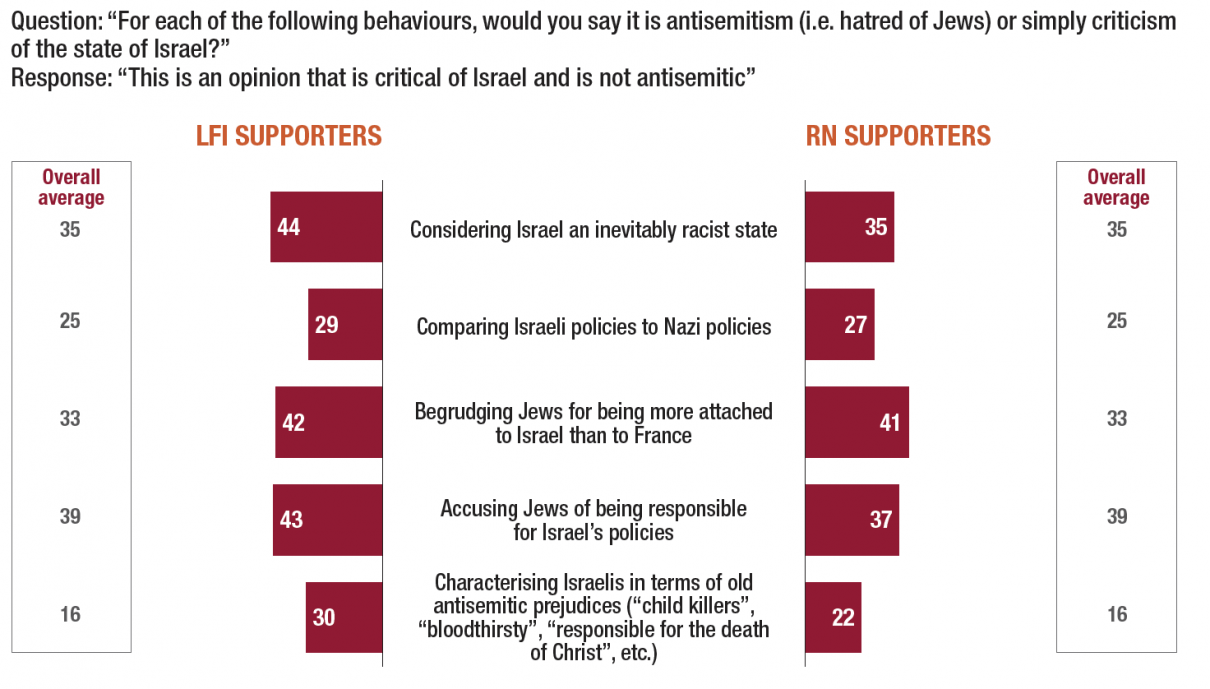
Copyright :
Ifop | AJC | Fondation pour l’innovation politique – March 2022

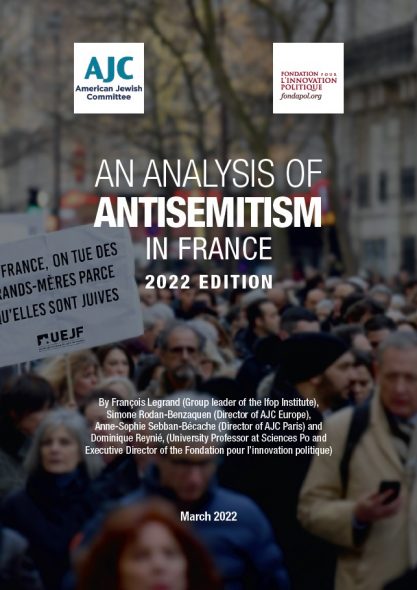
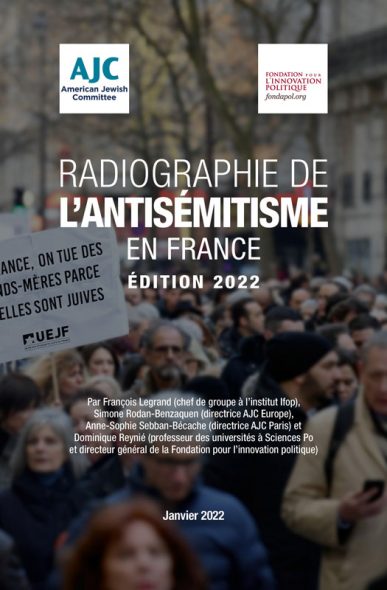
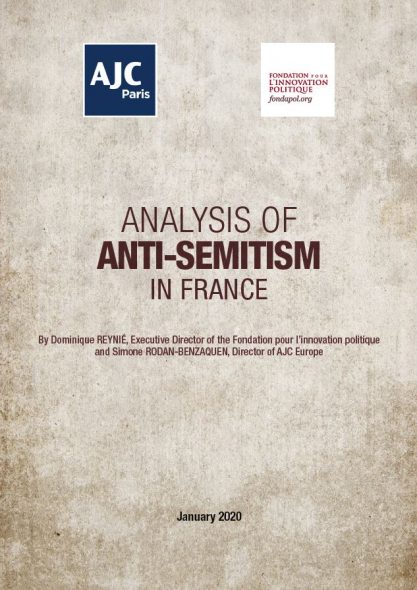
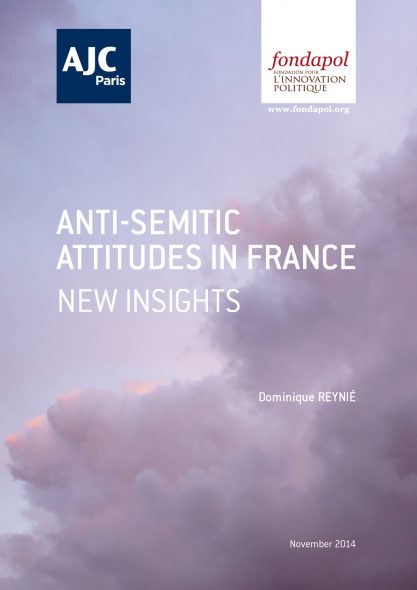
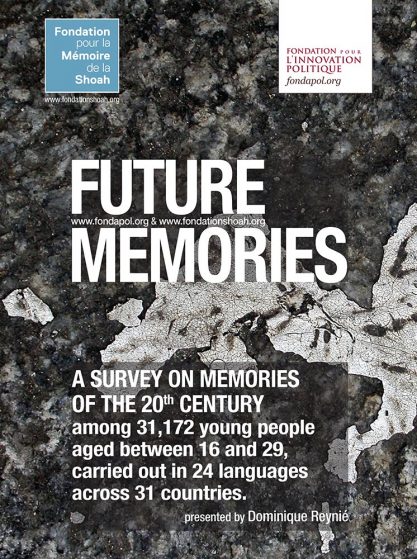



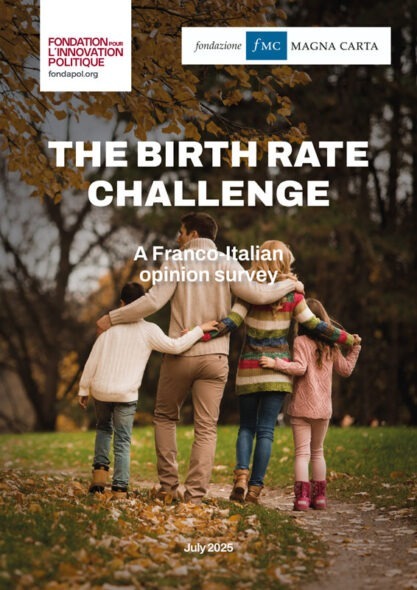
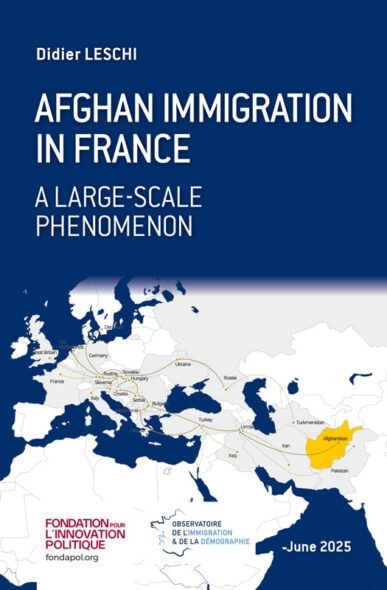
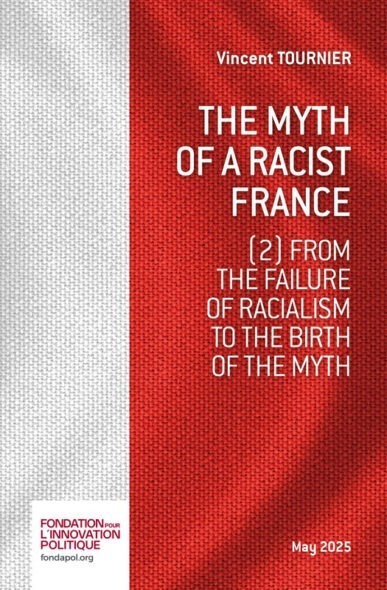
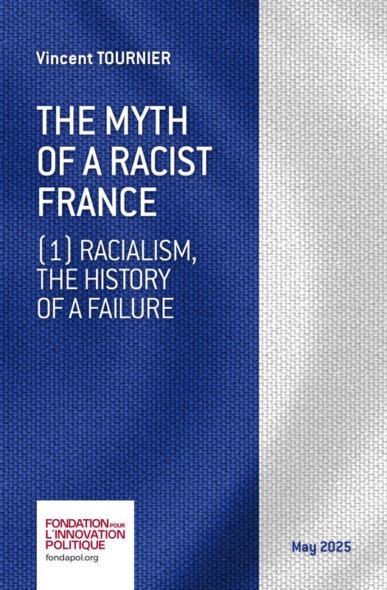
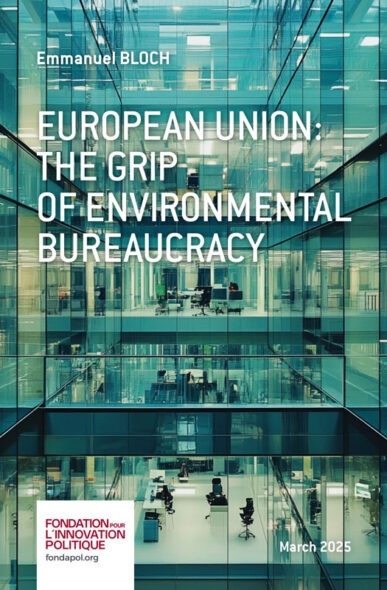
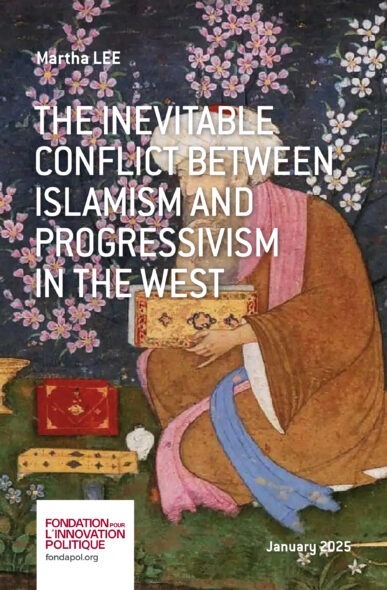
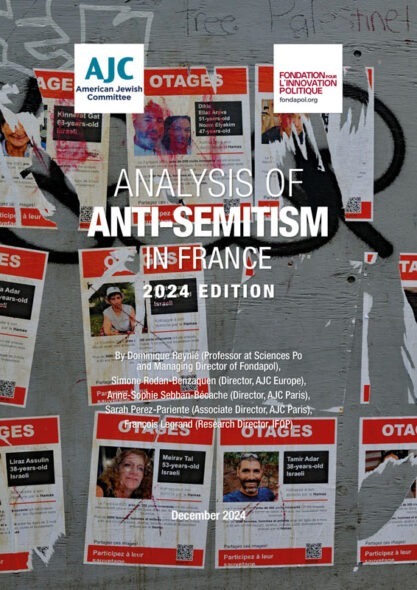
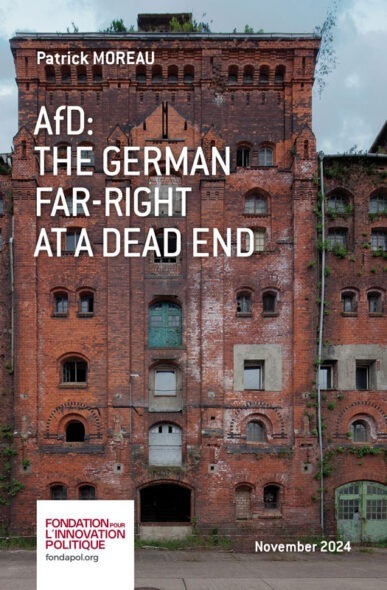
No comments.